#but I have read the Odyssey in the month between finally getting into Epic and the Thunder Saga release. it's one of my favourite books now
Explore tagged Tumblr posts
Text
Ok, Odysseus, the raining* king of Ithaca, is my Roman Empire.
And I don't particularly mean all the "adventures" he went through or the wrong he might have done.
It's the pain of a parent who has not been able to watch his child grow up.
He remembers him as a baby. He was once very close to home, to be able to see (and raise) him still as a child, but that too was taken from him. If it weren't for the right circumstances, he might not have recongnise him in adulthood.
* I apologize for this silly joke that still makes me smile.
#yes it's thanks to Epic#but I have read the Odyssey in the month between finally getting into Epic and the Thunder Saga release. it's one of my favourite books now#and both versions of Odysseus live in my head now and my heart aches for both of them for reasons that are sometimes similar#Epic's Odysseus is more centred on his wife which is very lovely and then his son#the original Odysseus seems to be more concerned for Ithaca and then his son#however they both care for all three#and the part where the original Odysseus finally reunites with Penelope is one of my favourite parts#I'm not a mother yet#don't know if I'll ever be#although I'd love to#just imagining being kept from my child for 20 years. not being to see them grow and be there for them when they would need me makes me cry#I don't know if I could survive that#I get extremly sad when thinking about Anticlea as well#Odysseus#Odysseus of Ithaca#Telemachus#Anticlea#parental love#the Odysseey#Epic: the Musical#“Time for me to be the father I never was”#oversharing#I'm having an emotional day today sorry about that
13 notes
·
View notes
Text
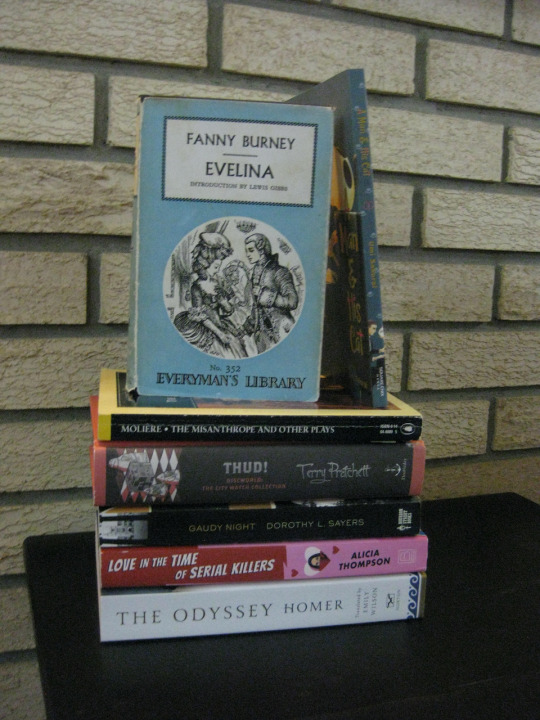
As you can maybe tell by the three reviews I posted in July, it was a good reading month! Overall, at least. I still had a couple “this was fine” and one DNF, but there were a lot of hits and I read more books than I have the last few months.
So, highlights: The Hollow Places was fantastic, as was Bookshops and Bonedust but for very different reasons. If you’re worried that Baldree won’t be able to repeat the magic of Legends and Lattes, stop now. It was pure cozy delight. March’s End didn’t get a review simply because I already had three coming, but it was also very good. It examines family dynamics and the realities of a portal fantasy world in a very complex, adult way. The characters are believable if not necessarily likeable, the world-building is great, the writing is strong… all the things.
But between March’s End, The Hexologists, and The Hollow Places, I needed a lot of lighter books to balance, as you can probably tell by the rest of my list. I enjoyed pretty much everything! I’m just sorry I didn’t like the Sanderson more but I guess that’s a sign he isn’t an author for me since I didn’t like the last book of his I read either. I’m also a bit sorry I couldn’t get into The Atlas Six because so many people love it, but I dropped it in a Little Free Library and it got snapped up almost instantly so hopefully it’s found a better home.
So that was my unhaul of the month! I … did not do well with my book haul, or perhaps I did too well with it. The Odyssey and Thud were both damaged books that came in at work and I couldn’t say no. Thud has some wear to the cover; the Odyssey has some uncut and weirdly bound pages I’ll need to slice open. (Have I read and do I own other editions of both? Absolutely.) Love in the Time of Serial Killers was an unexpected rebound—I originally got it as a reading copy and passed it on to a coworker, who sent it back when she’d finished.
And then, well. There’s a new bookshop opening in my metro area. They’ve taken over from a used bookstore and have to sell off its stock before they can properly move in their own. I had to go help out, right? I couldn’t find anything in their SFF section I wanted but still left with three books: Gaudy Night, Evelina, and a collection of Molière. I went with friends, the same day we saw Barbie. ’Twas a very good day, all around.
And last but not least, I have started on one of those long, dense reads that will last ages. I’ve had Music from the Earliest Notations to the Sixteenth Century on my shelf for years and made it a goal to finally start it this year, since it’s totally up my alley but also huge and academic. There was a point in July where I didn’t want epic stories, light stories, or narrative non-fiction, so I figured that was as good a time to start it as any. I’ll probably read a section or two a month, whenever a similar mood hits.
And now without further ado, in order of enjoyment…
The Hollow Places - T. Kingfisher
Kara moves into her uncle’s museum of weird after her divorce, only to discover another universe behind a wall.
9/10
🏳️🌈 secondary character (gay), disabled secondary character
warning: body horror
Bookshops and Bonedust - Travis Baldree
Viv is recuperating from an injury in a sleepy town, where she finds a struggling bookshop, new friends, and a mystery. Out in November.
9/10
🏳️🌈 main character (sapphic), 🏳️🌈 secondary character (sapphic)
March’s End - Daniel Polansky
The Harrows have been tasked for generations with protecting a fantastical other world, but now the family is fracturing and that could endanger everything.
8/10
major 🏳️🌈 character (lesbian), 🏳️🌈 secondary character (sapphic), African-American secondary character
warning: toxic family dynamics, commentary on colonialism
Imogen, Obviously - Becky Albertalli
Imogen puts the A in Ally and that’s fine. Then she visits her best friend in college and meets a girl….
8/10
🏳️🌈 main character (bisexual), main character with anxiety, 🏳️🌈 secondary characters (nonbinary, pan, lesbian, bisexual), Jewish secondary character, Brazilian-American secondary characters, secondary character with ADHD, Japanese secondary character, Black secondary character, 🏳️🌈 author, #ownvoices
warning: biphobia, discourse
The Hexologists - Josiah Bancroft
The Wilbys get more than they bargained for when they’re hired to find a lost royal heir and stop the king from baking himself into a cake. Out in September.
7.5/10
possibly biracial main character
The Bookbinder - Pip Williams
When World War I pushes Peggy out of her routine, she’s forced to choose: a life binding the books of the Oxford Press or a life studying them?
8/10
major autistic secondary character, disabled secondary character
warning: war, injuries
The Nobleman’s Guide to Seducing a Scoundrel - KJ Charles
Rufus is the new Earl of Oxney, saddled with a crumbling estate and a bitter family. Desperate for a good secretary, he hires Luke—who has a hidden agenda which doesn’t involve tupping the boss. And yet. Out in September.
7/10
🏳️🌈 main characters (demisexual-gay, gay), main character with dyslexia, 🏳️🌈 secondary characters (gay), minor Black British character
warning: toxic family dynamics, abuse
Weird Rules to Follow - Kim Spencer
Mia starts to notice that she and her best friend are living very different lives, with very different expectations from the adults around them.
7/10
Ts’msyen protagonist, Mexican-Canadian secondary characters, Ts’msyen secondary characters, Gitxsan secondary character, Ts’msyen author, #ownvoices, 🇨🇦
warning: racism, alcohol abuse
A Man and His Cat, Vol. 3 - Umi Sakurai with Taylor Engel (translator)
Kanda begins to deal with his emotional baggage, with the help of his cat and a fellow teacher.
7/10
Japanese cast, Japanese author, #ownvoices
Bookshop Cinderella - Laura Lee Guhrke
Evie is quite content as a spinster with a bookshop. Duke Maximilian has wagered he can make her the diamond of the season. This is a strictly platonic alliance, of course.
6/10
The Frugal Wizard’s Handbook for Surviving Medieval England - Brandon Sanderson
An amnesiac man wakes up in a country that may or may not be Anglo-Saxon England with an exploded guidebook. Good thing he has ~*~Mystical~*~ ~*~Powers~*~™.
6.5/10
Persian secondary character, Chinese-American secondary character
Picture Books
The Skull - Jon Klassen
Otilla finds a large house in the woods inhabited by a talking skull, so she helps him in return for shelter.
🇨🇦
DNF
The Atlas Six - Olivie Blake
Six ambitious magicians compete for a coveted place at the Library of Alexandria.
🏳️🌈 main characters (multisexual); Black-British, Cuban, Japanese, and Persian main characters; Filipino-American author
Currently reading:
Kill Show - Daniel Sweren-Becker
A teen goes missing after running back to her school bus for a bag. Forget podcasts: time for the reality show! Out in October.
warning: missing child, murder
The Wager - David Grann
A secret mission in the Age of Sail. A shipwreck and a mutiny. The perils of the sea—and your fellow man.
Music from the Earliest Notations to the Sixteenth Century - Richard Taruskin A history of early written European music, in its social and political contexts.
Stats
Monthly total: 11+1 Yearly total: 75/140 Queer books: 4 Authors of colour: 2 Books by women: 7 Authors outside the binary: 0 Canadian authors: 1 Off the TBR shelves: 1 Books hauled: 6 ARCs acquired: 4 ARCs unhauled: 6 DNFs: 1
January February March April May June
29 notes
·
View notes
Text
And now, for the scientific results.
Only 7.7% of you would like to read superhero Cinderella. So I guess I don't feel too bad that this is the only one that is not currently out, nor has a confirmed release date. It's coming though! But on to those of you who can actually buy the book you want to read!
A tie between fourth and fifth, with 9.8% each wanting to read fire magic Cinderella and kidnapped princess Cinderella.

If you've ever wanted to read Cinderella and Pride and Prejudice at the same time, the book is HERE. It's #2 of the series, with the first book being Sense and Sensibility/Snow White and Rose Red, and you should probably read that first, but it stands alone okay? A lot of people seem to like it, and you can grab it here if this is what satisfies your literary desires.

Now for the kidnapped Cinderella - this is a genderswapped Cinderella retelling, not my cleanest work, but I'm still pretty proud of it. (Father's sword instead of a fairy godmother, anyone?) Edward gets night vision goggles at one point and it's epic. Grab it here. It's pretty short and sweet, and it's only 99 cents!

Next, 11.2% of you wanted kitten!Cinderella, and y'all are actually in luck, because this one is free! It's the first story in the Tales of Ever After, and I highly recommend the whole set of tales. Some real gems in this one, so grab it now and enjoy it!
Now we have Cinderella and chess, which was actually the initial frontrunner. Y'all really wanted to know how how that goes down, well...

It's book six of a pretty order-dependent series, but you could get away with entering the series here. And it is an absolutely hilarious take on Cinderella. That is also The Merchant of Venice and the last act of the Odyssey. So go check it out and enjoy!
Okay, second place, with 21.7% is actually not released yet, either, but this one IS up for preorder.

Cinderella, but Cinderella isn't who she says she is, and is wearing a glamour to make herself appear as the prince's ideal woman. It's coming next February, and I tell you, I am PUMPED for this book.
And, finally, our winner, with 23.8% of the votes, we have... (drumroll please...)

This one is a short and sweet story, the stepmother's perspective of what happened ... and it's not quite the story that Cinderella tells. It's a second chance romance, and I do love it.
So ... that's all of the Cinderella I've written and/or plan to release within the next year. There may be more Cinderella to come after this. Who knows? Every time I think I'm done retelling this fairy tale, I come up with another angle for it.
Then again, I am the person releasing at least four retellings of Beauty and the Beast next month, and quite possibly five of them. Cheers!
52 notes
·
View notes
Text

THE STEVIE FILES PROUDLY PRESENTS - THE AMAZING ROCK & ROLL ODYSSEY OF STEVEN VAN ZANDT
From The Source to Soulfire via Springsteen and Sam & Dave
Recorded, transcribed, edited, written, produced, mixed and mastered by MIKE SAUNDERS
SIDE TWO (1975-1983)
Track 6: Miami Steve, The Asbury Jukes, Tenth Avenue and Hammersmith
In early 1975, Steven returned to New Jersey from Florida, inappropriately dressed for the winter weather. “I came back with the flowered shirts and the Sam Snead hat and continued wearing them in the snow.” For the next seven years, he was known as Miami Steve. He joined Southside in the Blackberry Booze Band and within weeks they’d altered and expanded its line-up (adding keyboard player Kevin Kavanaugh from Middletown and bass player Alan Berger from The Dovells’ backing band), transformed its musical direction, changed its name to Southside Johnny and the Asbury Jukes (referencing their mutual hero Little Walter’s band and first single release) and established a successful three-nights-a-week, five-sets-a-night residency at the Stone Pony in Asbury Park.
“Just before that, me, Southside, Bruce and Garry went to see Sam & Dave. A life-changing moment. So me and Southside basically decided we were gonna be the white Sam & Dave, with rock guitar. So the horns came in and although we didn’t know it, we would change the entire concept of what a bar band sounded like and the respect a bar band would get by making it creative, soul meets rock. ‘Bar band’ was an insult. ‘You’re a bar band,’ which means you can’t make it in the real music world. After the Jukes, they started using ‘bar band’ in reviews and they meant it as a compliment, with Graham Parker and Elvis Costello and Mink DeVille. We changed the way people thought about these things.”
The Miami Horns were a vital component of the new band. Steven composed the horn arrangements, but although he’s always possessed a natural ability to imagine horn parts, he doesn’t read or write music (“never have”) and has always required a little help from his friends to transcribe them. “I have people write ‘em down, to this day. I like that actually. You have to do a lotta things yourself so any excuse I find to collaborate I do it. I find other people will bring something to the party usually. That’s why [I’ve] used Eddie Manion for I don’t know how many years. He knows how I like to voice things. Once I think of something and create the parts, I get bored if I have to voice every part, exactly right. If I hear a voicing I don’t like, I will change it, but I get bored by the mechanics of everything.”
While the Jukes were building their reputation and growing their audience, Bruce invited Steven to hang out at the Born To Run sessions in New York, where he was working on “Tenth Avenue Freeze-Out.” David Sanborn and The Brecker Brothers had been hired to play the horn parts, but Steven created a spontaneous new arrangement. He’s told this anecdote countless times, but I ask him to repeat it because it provides perfect examples of his innate musical talents in action (“I can hear the parts, who knows why?”), the nature of his friendship with Bruce (“I still am the only human being not afraid of him”), and his no-bullshit attitude (“I didn’t know anything about diplomacy”).
“So he says, ‘Whaddya think?’ I said, ‘It sucks, that’s what I think!’ I didn’t know how uptight everybody was. I didn’t give a fuck either. The managers and producers were all afraid of him already. He asked me a question, I’m gonna be honest. I’m trying to help my friend here, not make points with some fucking record company guy. Moment of silence. ‘He just said it sucks, which means we all suck.’ Bruce [says] ‘Alright then, go in and fucking fix it.’ So I did. I went in and sang the [new] parts. I didn’t know they were the most famous [session] guys in New York. It wasn’t insulting them, the chart was ridiculous. That was my thing, just from the Jukes being around maybe six months.”
“I wasn’t really feeling the pressure that Bruce was at the time. I didn’t realise his life depended on this album. His first two records hadn’t done very well. They wanted to drop him. I don’t know how aware I was of any of that. He invited me into the session and I’m laying on the floor. All I can think is, we’ve been hoping to get into recording our whole lives, I’m listening to this and it sounds fucking terrible. Not just the horn charts, everything. It was the worst period of recording in history. Virtually every record from the 50s and 60s sounded great, virtually every record from the early 70s sounded terrible. Because engineers took over, started close miking, padding the walls. Separation, separation, separation, all the things that make rock ‘n’ roll suck. The idea was, you isolate everything and make it sound exciting in the mix. Which they managed to do, miraculously, with the Born To Run album. Because it was pieced together in a bizarre way. Bruce made that record 100% out of willpower, he willed that into existence!”
Soon after making his instinctive artistic contribution (and singing backing vocals on “Thunder Road”), Steven was invited to join the E Street Band. It was a chance to complete the circle, play with his old friend again and settle any unfinished business from three summers earlier, when he’d been sent packing at the Greetings sessions. He made his live debut on the opening night of the Born To Run tour, which ran until New Year’s Eve. His input and influence over the next decade, onstage and off, would prove invaluable. (Bruce even began playing The Dovells’ “You Can’t Sit Down” as an occasional encore). In the fall, the tour took everyone to Europe for the first time, where the culture shock was off the charts. “There was no hamburgers, no peanut butter. The only place you could get a hamburger in the whole of Europe was the newly-opened first Hard Rock Café. There was a line around the block even then.”
Culinary deficiencies aside, Bruce also had to endure the overblown hype surrounding his first UK gigs at London’s Hammersmith Odeon, where Columbia had displayed the legend “Finally London Is Ready For Bruce Springsteen” on every available surface prior to his arrival. “[It was] completely obnoxious,” says Steven. “[Bruce] spent half the time ripping down posters. It was an embarrassing time for him, between that and Time and Newsweek. He didn’t like that stuff. You wanna be in charge of your life, that’s why we get into rock ‘n’ roll. Suddenly it was slipping out of his control. We made the mistake of playing a place with seats. It just made the show that much harder. But by the end, we got ‘em outta the seats. We went to Amsterdam, Stockholm, and back to London. The second one was a bit easier.” The experience had a prolonged effect on Bruce. “He was uptight in those days and would remain so through Darkness into The River, until he asked me to produce the record and we found a way to have some fun.”
Track 7: Epic Records, Steve Popovich and The Stone Pony
Back on the shore, Southside Johnny and the Asbury Jukes continued the Stone Pony residency throughout 1975, gradually consolidating their line-up. For the next three years, between Springsteen commitments, Steven worked as their producer, arranger, manager, part-time guitarist and principal songwriter. In early 1976, after circulating a demo tape, they signed a recording deal with Epic, with assistance from Steve Popovich, the label’s Vice-President of A&R. “I Don’t Want To Go Home,” the song that Steven had kept in his back pocket since his days on the oldies circuit, became the title track of their debut album and their first single. Ben E King’s loss was Southside’s gain.
“I produced [the song] in a way which was appropriate for the Jukes. They didn’t have a big background vocal thing going on,” explains Steven. “I was very conscious of being able to try and do most of it live, although I put strings on it, on my very first production! There was no synthesiser in those days that could play strings. That’s why I re-cut it [on Soulfire] the original way I pictured it, with the singer and background vocals answering. That idea of writing for someone else is extremely important, critical and essential. It changes the way you write completely, from when you think of writing for yourself, which is extraordinarily complicated and confusing. It’s not easy, but easier, to write for someone else. There’s their identity in your mind at least. I’m writing them a song. That’s a wonderful exercise for songwriters.” I Don’t Want To Go Home was released in the summer of 1976 (“I’ve never received one penny of royalties, but whatever!”). The Jukes later began their first national tour and made their European debut in 1977.
Recommended by Bruce, Steve Popovich was one of a kind. “The last of the real music guys in the business. The only other person I can compare him to would be Lance Freed on the publishing side, who’s unique. He’s actually into music and songwriting and the things you’re supposed to be into when you have a job description like that. And Frank Barsalona, the only agent who really did his job and would set the standard for everybody to follow. Those three guys, really quite historic. [It was] Popovich’s idea to launch the record with a broadcast from the Stone Pony. Never been done before. Popovich loved the local scene idea and he largely made it happen. It never would have been recognised nationally, I don’t think, if it hadn’t been for Popovich, who had the vision to say it’s cool if you’re not from New York. Rather than being embarrassed if you’re not from New York, LA or Nashville, it’s actually cool.”
Track 8: Production Credits and Political Awakening
Steven developed his talents as a producer and songwriter with the Jukes in the late 70s, following I Don’t Want To Go Home with This Time It’s For Real and Hearts Of Stone. Successive releases featured greater quantities of his original material, which included “I Played The Fool,” “This Time Baby’s Gone For Good,” “Take It Inside” and “Some Things Just Don’t Change,” apparently written for another of his heroes, David Ruffin of The Temptations. During this period, he also produced the “Say Goodbye To Hollywood” single for Ronnie Spector and the E Street Band and provided production assistance on Darkness On The Edge Of Town. His relationship with the Jukes ended when they left Epic for Mercury in 1979 and he went on to co-produce The River and two comeback albums for Gary US Bonds, Dedication and On The Line. It was an impressive fast-track apprenticeship. Steven had no production experience when he began. He acquired the skills and learned from his mistakes in the studio. “That’s why all three Jukes albums are different,” he says. “By the time we did The River, I knew what I wanted to do. I got it all down by then. That’s how I tend to do things. I can picture what I want. Jump in, do it, let’s see what happens.”
Steven also kept his promise to himself to bring his musical heroes out of obscurity, initially as guests on the first two Jukes albums. “I did what I could, but I wanted to do so much more,” he admits. “First time I get in a studio, got Lee Dorsey out from under a car, where he’s a mechanic. Got Ronnie Spector out of retirement. Second album, we reunited The Coasters, Drifters and Five Satins. Me and Bruce worked with Gary Bonds. We got Ben E King and Chuck Jackson on that record. Those artists had a talent level noticeably above everybody that followed. I wish I’d been insistent on doing more of them. In those [early] days, you actually had to have talent to make records. You had to be able to sing a song, beginning to end, perfectly in tune, perfectly the right melody, and if you fuck up one word, you gotta do the whole thing again. Couldn’t do enough for those people, they were so much fun to produce.”
In addition to his studio accomplishments, Steven played more than 300 shows with Bruce and the E Street Band between 1976 and 1981, primarily on the Darkness On The Edge Of Town and River tours. The majority took place in North America, but the River tour included a European leg that took the band away from home and out of their comfort zone for nine weeks. Much longer than their previous visit in 1975, it was their first significant experience of foreign countries, languages, cultures and political perspectives. They received rave reviews wherever they played, but Steven gradually became aware that not all Europeans viewed the United States in a favourable light.
One particular encounter was pivotal in dramatically reshaping Steven’s worldview. “A kid asked me, ‘Why are you putting missiles in my country?’ I said, ‘I’m not, I’m a guitar player.’ I realised, for the first time in my life, at the age of 30 I’m embarrassed to say, that I’m an American. What the fuck does that mean? I managed to grow up in the middle of civil rights, the Vietnam War, demonstrations about every fucking thing and had no interest in any of it. Amazing when you think about it. Redefining tunnel vision. Suddenly, the tunnel is gone. We’re now successful. Who would have ever figured that would happen, right? Now it’s like, uh-oh, what did I miss, the last 20 years?”
Track 9: Men Without Women, Motown and Mixing In Mono
This revelation accelerated Steven’s growing political awareness, one of two important developments in 1981 that would change the course of his life forever. The second came when he returned from Europe and was approached by EMI America about making a solo album. Having spent six years producing and writing for others, he welcomed the opportunity to have his own creative outlet, which soon expanded into a separate career. In the fall, he enlisted musicians from the E Street Band and the Asbury Jukes to record most of the material for his debut album, Men Without Women, using his established rock-meets-soul sonic blueprint. Including “Lyin’ In A Bed Of Fire,” “Princess Of Little Italy,” “Angel Eyes” and “Until The Good Is Gone,” it remains an undisputed career highlight for Van Zandt devotees, but Steven feels that an outside producer might have helped him make a more commercial record.
“Conventional wisdom is you never should produce yourself and I have to say that’s correct. The only exception I can think of in the history of the business was Prince, who was an extraordinary genius, but other than him, I don’t know anybody who successfully produces themselves.” Describing himself as “extremely schizophrenic, I’m twelve different people, never mind two,” Steven explains how his inner producer failed to control the whims of his inner artist. “Without knowing it, the artist takes over. I was into this extreme naturalism, no logical reason why. I did the whole album live in one day. Came back the second day, did it again, beginning to end. Couple overdubs, that was it. There’s one guitar. The horns aren’t doubled. Nothing’s doubled. Bruce did all the harmony on that record but we couldn’t use his name. We [did] a similar thing with Born In The USA, where we just recorded live in the studio.”
“I made Bob Clearmountain mix ‘Forever’ in mono, to try and achieve the perfect Motown record. It’s never gonna be exact and it shouldn’t be exact, why should it be, but I wanted to capture a Smokey Robinson Motown record. The only way I could do that in my mind was to make it completely mono. He was so good in those days. I mean Bob’s still the best, but in those days he was beyond the best. He was something else when it came down to that Neve board that wasn’t automated, and he’s feelin’ those faders. I made him do something he’d never done before, which requires a whole different way of thinking. You’re now thinking depth-wise and vertically, not horizontally.”
“That’s where my head was at. Can I achieve the emotional communication that my heroes had provided me? My heroes being Motown in general, 10 acts there. Or my heroes at Chess, another 10 acts. Sam Phillips did ‘Rocket 88’ for Ike Turner (Jackie Brenston) and ‘How Many More Years’ for Howlin’ Wolf, three years before Elvis Presley. Unbelievable genius. [I’m] trying to achieve that level of quality in my own world, in my own little bubble, which has these ridiculously high standards. I’m absorbing the 50s and 60s and then trying to integrate them in my head and reproduce them in my own way, not the least bit interested in what’s going on in the 70s or 80s certainly, because it was shit to me, comparatively. An interesting moment here and there. Punk was certainly interesting. But mostly it’s all coming from what I call the renaissance period, ‘51 to ‘71, where it all was created. And that’s true to this day. That’s all I was interested in and that was enough for 10 lifetimes. I didn’t need another bit of input after 1972.”
Track 10: Little Steven, Little Richard and Bob Dylan
In 1982, after recording with Bruce and Gary US Bonds, Steven completed his album, formed the Disciples of Soul (which included Dino Danelli from The Rascals on drums, Jean Beauvoir on bass and Eddie Manion, Mark Pender, Stan Harrison and La Bamba on horns) and played a debut concert at New York’s Peppermint Lounge. Released in October, a month after Nebraska, Men Without Women preceded his first national tour and was credited to his new professional name of Little Steven, which would be used for all future solo activities. “I just wanted separation [from] being the sideman,” he explains. “Each of my personalities required a different name, in order to keep it straight in people’s heads and my own head.” The name referenced his early heroes Little Walter, Little Anthony and Little Richard. In his role as an ordained minister, the latter officiated at Steven’s wedding to Maureen Santoro in New York on New Year’s Eve. Percy Sledge sang “When A Man Loves A Woman” as they walked down the aisle and the reception included performances from Gary US Bonds, Little Milton, The Chambers Brothers and the wedding band from The Godfather. “Little Anthony was doing a cruise at the time or he would have been there.”
“All I can think is, we’ve been hoping to get into recording our whole lives, I’m listening to this and it sounds fucking terrible. Not just the horn charts, everything. It was the worst period of recording in history. Virtually every record from the 50s and 60s sounded great, virtually every record from the early 70s sounded terrible. Because engineers took over, started close miking, padding the walls. Separation, separation, separation, all the things that make rock ‘n’ roll suck. The idea was, you isolate everything and make it sound exciting in the mix. Which they managed to do, miraculously, with the Born To Run album. Because it was pieced together in a bizarre way. Bruce made that record 100% out of willpower, he willed that into existence!”
Steven toured internationally in 1983, then dropped the horns, adopted a more contemporary rock sound and made his second album, Voice Of America. It was an explicitly political record that featured “Solidarity,” “I Am A Patriot,” “Out Of The Darkness,” “Los Desaparecidos” and “Undefeated.” Triggered by his River tour experiences in Europe, this radical transformation was completed with a long period of self-education. “I read every book about post World War Two [US] foreign policy. [It was] shocking how often we were on the wrong side. All of these bad things were happening behind the scenes and nobody was talking about them. No political consciousness whatsoever in the country. I decided I have an obligation to say something about this stuff that we’re all paying for with our taxes.”
“Being conscious of the fact that everybody needs their own identity, I figured who the hell needs another love song from a fucking sideman? I’ll be the political guy. Nobody else is doing it. There were people demonstrating of course. Jackson Browne, John Hall, Bonnie Raitt, Graham Nash, those guys. The Grateful Dead were doing a benefit every week, but rarely did it end up in the work. In general, people weren’t putting much politics into the lyrics of their songs.” For artists with commercial aspirations, he concedes, that’s a smart move. “Jefferson Airplane being an exception with ‘Volunteers.’ Big exception, Crosby, Stills, Nash and Young, with Neil Young’s ‘Ohio.’”
Steven contends that Bob Dylan’s “Subterranean Homesick Blues” introduced the idea of political consciousness in rock ‘n’ roll. “His first electric song. It’s not given enough credit. The first sentence from Bob Dylan’s electric period, ‘Johnny’s in the basement mixing up the medicine, I’m on the pavement thinking about the government.’ What? You’re doing what? You’re thinking about the government? Excuse me? Who does that? Whoever did that before, in a song, no less? There in that one sentence, Bob Dylan communicated what his entire career was gonna be about, which was having fun with language, with inference, symbolism, metaphor and nonsense lyrics that rhymed. ‘Johnny’s in the basement mixing up the medicine,’ what does that mean? It means whatever you want it to mean, right? Then ‘I’m on the pavement thinking about the government.’ Holy shit! You mean we’re supposed to figure out the government? That, to me, is the most important sentence in all the history of rock ‘n’ roll, right there.”
All photos below by Mike Saunders
7 notes
·
View notes
Text
#BehindTheTruth #WorkingWithGov.
Part 3:
{The following morning, I got dressed and had some breakfast. I was looking over the papers I had. Something caught my eyes, it was the letter I had gotten from my mother. It was the one that detailed my father's death and how she was hidden when it had happened. It has been three years now that he was killed but I had not known who had done it. I had thought it was a gang never in a million years. I read the letter twice but the part of who really did it I read that part at least three or four times now. I couldn’t believe what I had read, I picked up the phone to call my mother to hear it from her but she didn't answer when I called.
My mother finally answers the phone and tells me she is outside of my door. I open the door and my mom Helena walks in. We sat and talked for hours about the letter I had and learned how my father was really killed. I couldn't believe that he was killed by a group of lesser whatever that is.
Later on that day I went to the Caldwell police station to file a report of the killing. Some of the police officers look at me as if I was crazy. I end up walking away from them till a man stops me to speak to me about what I was really doing to talk to these people. I learned his name is Mharcus and he will help me with my report. We left the station and headed to his place to talk, once we arrived we sat in his living room to talk.
I spent hours explaining to Mhacurs about what I knew about my father killing. Mhacrus looked at me as he was going to do something but stop. Mhacrus ends up offering me a job when I tell him all about the history stuff I know. I agree to his offer and work for him, it seemed like the best bet to work with him to get these people killed for what they did to my family.
After leaving Mhacrus place, the more likely one of his drivers took me home. My mother was still here when I told her about the job from this government agent. She was happy that I found someone to help her look into this. My mother and I spent hours on the information I had on vampires and what one of my colleagues had on them as well.
I had shown my mother the ancient symbol for the vampires, the Egyptian ankh. The look that my mother had told me something but I knew to not ask her till she was ready to tell me whatever it was on her own time. I knew that my mom knew what the symbol meant and I knew not to push her to tell me things. My mother was a symbology expert just as me and sometimes we work together. If this ankh was what my mother reminded me it could be, I still couldn't place this thing to them.
I wasn’t sure if this ankh was connected somehow to vampires. There had to be another way to prove this and I didn’t know how not yet anyway. The more I look at this ankh the more it looks like it was true. I went to my library to look for some books that I had gotten from my travels but these few books I had were written in some weird language which I still have not been able to figure out. I had even talked to my mother about them and she couldn't figure them out. I was thinking of either making a few copies and have one of my colleagues look them over to see if they knew of the language or not. I could tell it was old but whoever wrote it could use some kind of different way of writing.
I went over to my desk to see if I could remember where I had found these books. I was searching my papers when one of the papers caught my eye of ancient Babylonia that talked about one of its first demons that became a vampire. There was a legend of Lilith/Lilitu (and a type of spirit of the same name) originally arose from Sumer, where she was described as an infertile "beautiful maiden" and was believed to be a harlot and vampire who, after having chosen a lover, would never let him go. Lilitu (or the Lilitu spirits) was considered to be an anthropomorphic bird-footed, wind or night demon and was often described as a sexual predator who subsisted on the blood of babies and their mothers. Other Mesopotamian demons such as the Babylonian goddess Lamashtu, (Sumer's Dimme) and Gallu of the Uttuke group are mentioned as having vampiric natures.
Lamashtu is a historically older image that left a mark on the figure of Lilith. Many incantations invoke her as a malicious "Daughter of Heaven" or of Anu, and she is often depicted as a terrifying blood-sucking creature with a lion's head and the body of a donkey. Akin to Lilitu, Lamashtu primarily preyed on newborns and their mothers. She was said to watch pregnant women vigilantly, particularly when they went into labor.
Then there was more information in Ancient Greek mythology containing several precursors to modern vampires, though none were considered undead; these included the Empusa, Lamia, and striges (the strix of Ancient Roman mythology). Over time the first two terms became general words to describe witches and demons respectively. Empusa was the daughter of the goddess Hecate and was described as a demonic, bronze-footed creature. She feasted on blood by transforming into a young woman and seduced men as they slept before drinking their blood. Lamia was the daughter of King Belus and a secret lover of Zeus. However Zeus' wife Hera discovered this infidelity and killed all Lamia's offspring; Lamia swore vengeance and preyed on young children in their beds at night, sucking their blood.
Like Lamia, the striges feasted on children, but also preyed on adults. They were described as having the bodies of crows or birds in general, and were later incorporated into Roman mythology as strix, a kind of nocturnal bird that fed on human flesh and blood. The Romanian vampire breed named Strigoï has no direct relation to the Greek striges, but was derived from the Roman term strix, as is the name of the Albanian Shtriga and the Slavic Strzyga, though myths about these creatures are more similar to their Slavic equivalents. Greek vampiric entities are seen once again in Homer's epic Odyssey. In Homer's tale, the undead are too insubstantial to be heard by the living and cannot communicate with them without drinking blood first. In the epic, when Odysseus journeyed into Hades, he was made to sacrifice a black ram and a black ewe so that the shades there could drink its blood and communicate.
Then there was more in India, tales of vetalas, ghoul-like beings that inhabit corpses, are found in old Sanskrit folklore.The vetala is described as an undead creature who, like the bat associated with modern-day vampirism, hangs upside down on trees found on cremation grounds and cemeteries. Pishacha, the returned spirits of evil-doers or those who died insane, also bear vampiric attributes.
The Hebrew word "Alukah" (literal translation is "leech") is synonymous with vampirism or vampires, as is "Motetz Dam" (literally, "blood sucker").
Later vampire traditions appear among diaspora Jews in Central Europe, in particular the medieval interpretation of Lilith. In common with vampires, this version of Lilith was held to be able to transform herself into an animal, usually a cat, and charm her victims into believing that she is benevolent or irresistible.However, she and her daughters usually strangle rather than drain victims, and in the Kabbalah, she retains many attributes found in vampires. A late 17th- or early 18th-century Kabbalah document was found in one of the Ritman library's copies of Jean de Pauly's translation of the Zohar. The text contains two amulets, one for male (lazakhar), the other for female (lanekevah). The invocations on the amulets mention Adam, Eve, and Lilith, Chavah Rishonah and the angels—Sanoy, Sansinoy, Smangeluf, Shmari'el, and Hasdi'el. A few lines in Yiddish are shown as dialog between the prophet Elijah and Lilith, in which she has come with a host of demons to kill the mother, take her newborn and "to drink her blood, suck her bones and eat her flesh". She informs Elijah that she will lose power if someone uses her secret names, which she reveals at the end.
There was so many in Various regions of Africa have folkloric tales of beings with vampiric abilities: in West Africa the Ashanti people tell of the iron-toothed and tree-dwelling asanbosam, and the Ewe people of the adze, which can take the form of a firefly and hunts children. The Eastern Cape region of South Africa has the impundulu, which can take the form of a large taloned bird and can summon thunder and lightning, and the Betsileo people of Madagascar tell of the ramanga, an outlaw or living vampire who drinks the blood and eats the nail clippings of nobles.
The Loogaroo is an example of how a vampire belief can result from a combination of beliefs, a mixture of French and African Vodu or voodoo. The term Loogaroo possibly comes from the French loup-garou (meaning 'werewolf') and is common in the culture of Mauritius. However, the stories of the Loogaroo are widespread through the Caribbean Islands and Louisiana in the United States.[80] During the late 18th and 19th centuries, there was a widespread belief in vampires in parts of New England, particularly in Rhode Island and Eastern Connecticut. There are many documented cases of families disinterring loved ones and removing their hearts in the belief that the deceased was a vampire who was responsible for sickness and death in the family, although the term "vampire" was never actually used to describe the deceased.
The deadly disease tuberculosis, or "consumption" as it was known at the time, was believed to be caused by nightly visitations on the part of a dead family member who had died of consumption themselves. The most famous, and most recently recorded, case of suspected vampirism is that of nineteen-year-old Mercy Brown, who died in Exeter, Rhode Island in 1892. Her father, assisted by the family physician, removed her from her tomb two months after her death and her heart was cut out and burnt to ashes.
Legends of female vampire-like beings who can detach parts of their upper body occur in the Philippines, Malaysia, Cambodia and Indonesia. There are two main vampire-like creatures in the Philippines: the Tagalog Mandurugo ("blood-sucker") and the Visayan manananggal ("self-segmenter"). The mandurugo is a variety of the aswang that takes the form of an attractive girl by day, and develops wings and a long, hollow, thread-like tongue by night. They use an elongated proboscis-like tongue to suck fetuses off pregnant women. They also prefer to eat entrails (specifically the heart and the liver) and the phlegm of sick people. The manananggal is described as being an older, beautiful woman capable of severing its upper torso in order to fly into the night with huge bat-like wings and prey on unsuspecting, sleeping pregnant women in their homes. The tongue is used to suck up blood from a sleeping victim.
I had so many books on vampires that I picked up on my travels around the world, on my last trip I was in Alexandria, Egypt. I went to the great library of Alexandria well now it is called the Bibliotheca Alexandrina, which functions as a modern library and cultural center, commemorating the original Library of Alexandrina. When I was there that was where I found a lot of the books that I was able to bring home with me just as long as I would send them back home. That was till I had a talk to the president of Egypt about my research I was doing on the books and that I would be using some of the books in my classroom. I would also teach a class of ancient Egyptian mythology to any of the students from Egypt. That is how I have these books, well some of them. The mysterious books that I did find were not in Egypt's great library but in two libraries one in London and one in Italy. The more I learned of this town, I learned that it had a mix of many cultures, from other countries.
I came out of my thoughts when my phone ping with a text message, it was from Mhacrus that he was asking me to come to the police station. I texted him back asking him what it was really about? I waited for his response, which was that there was some strange symbol that he wanted me to help explain what it is and what it means. I told him that I was coming in to see it and see if I can help him.
#WorkingWithGov
1 note
·
View note
Text
Summer TBR | Jasmine Alexa

All my Master’s assignments have been researched, written, and handed in; now it’s time for me to continue working on my dissertation (due in a couple of months’ time but still in the first stages!) and read. I thought I’d share with you my tentative Summer to-be-read list, which I may not strictly adhere to but I can try anyway.
1. The Days of Abandonment and The Lost Daughter by Elena Ferrante
Having read and absolutely loved Ferrante’s Neapolitan Novels, I’ve decided to read her earlier novels. She’s easily one of my favourite writers — her complex characterisation, especially of female characters, her flawless style, and her plots make her novels really captivating reads.
2. The Odyssey by Homer
I confess I haven’t read as many ancient classics as I should’ve by now. I’d like to start from The Odyssey because it’s an epic voyage in the Mediterranean Sea and one of the most canonical literary journeys of all time. Last summer, I read the modernist retelling of The Odyssey by James Joyce, Ulysses. Perhaps after The Odyssey, I could read Madeline Miller’s Circe.
3. Wide Sargasso Sea by Jean Rhys
Yet another classic, this time round a classic within the feminist revisionist retelling canon. Rhys retells Charlotte Brontë’s Jane Eyre by giving voice to the ‘madwoman in the attic’. This one should not take long and I’ll finally be able to say I’ve read it.
4. The Last Supper by Rachel Cusk
The first nonfiction book on this list! Recently, I’ve read and absolutely loved Cusk’s autofictional novel Outline. She’s a very fine writer and I’m curious to see how it translates to nonfiction. The Last Supper tracks Cusk’s journey in Italy in search of art and culture. It takes place during summer, so it’d be appropriate to read it soon!
5. Campo Santo by W. G. Sebald
If you know anything about me, you know that Sebald is one of my favourite writers of all time and I’ve read quite a few of his works. The first part of Campo Santo consists of essays on his travels to Corsica, which I’ve dipped into and I’d really like to get back to.
6. Middlemarch by George Eliot
This monumental work (monumental both in size and fame) must be read, at some point, so why not now? It’s often hailed as ‘the best novel in English literature of all time’.
7. Fiesta: The Sun Also Rises by Ernest Hemingway
I’ve read Hemingway’s Paris memoir A Moveable Feast but I’m still unacquainted with his fiction. This is meant to be quintessential Lost Generation book, which I confess I’ve already tried reading twice but I’m willing to try it again (one last time?).
8. Between the Acts by Virginia Woolf
Woolf is another favourite writer (I wrote my undergraduate dissertation on Orlando and another book by Gertrude Stein) but I haven’t read a novel by her in a long while. Last summer, I read The Waves, which was stunning. This is a short one!
9. Daisy Miller by Henry James
I’ve read 'The Aspern Papers’ by James for a course at university but I didn’t like it that much. Ever since, I’ve been disinclined to read James. But Daisy Miller is a short read about Americans in Italy.
10. The Name of the Wind by Patrick Rothfuss
This is meant to be fantasy at its finest, much loved by people I care about! I read the prologue and the writing is very beautiful.
(The titles are affiliate links.)
55 notes
·
View notes
Photo
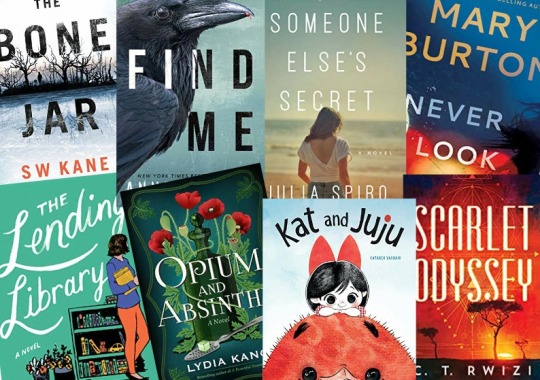
Amazon First Reads for June 2020
I know I say this every single month, but I can’t get over how quickly the last month has gone. Meaning that for Amazon Prime Members we get to choose which Amazon First Read were going to download for free. Again this month as most months there are eight books to choose from.
This months choices are:
Suspense
The Bone Jar by S W Kane, Pages: 328, Publication Date: 1 July 2020
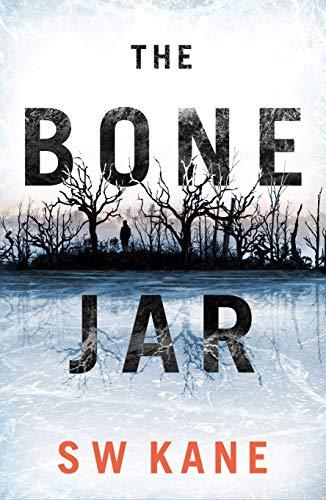
Synopsis: Two murders. An abandoned asylum. Will a mysterious former patient help untangle the dark truth?
The body of an elderly woman has been found in the bowels of a derelict asylum on the banks of the Thames. As Detective Lew Kirby and his partner begin their investigation, another body is discovered in the river nearby. How are the two murders connected?
Before long, the secrets of Blackwater Asylum begin to reveal themselves. There are rumours about underground bunkers and secret rooms, unspeakable psychological experimentation, and a dark force that haunts the ruins, trying to pull back in all those who attempt to escape. Urban explorer Connie Darke, whose sister died in a freak accident at the asylum, is determined to help Lew expose its grisly past. Meanwhile Lew discovers a devastating family secret that threatens to turn his life upside down.
As his world crumbles around him, Lew must put the pieces of the puzzle together to keep the killer from striking again. Only an eccentric former patient really knows the truth—but will he reveal it to Lew before it’s too late?
Contemporary Fiction
Someone Else’s Secret by Julia Spiro, Pages: 363, Publication Date: 1 July 2020

Synopsis: Here’s the thing about secrets: they change shape over time, become blurry with memory, until the truth is nearly lost.
2009. Lindsey and Georgie have high hopes for their summer on Martha’s Vineyard. In the wake of the recession, ambitious college graduate Lindsey accepts a job as a nanny for an influential family who may help her land a position in Boston’s exclusive art world. Georgie, the eldest child in that family, is nearly fifteen and eager to find herself, dreaming of independence and yearning for first love.
Over the course of that formative summer, the two young women develop a close bond. Then, one night by the lighthouse, a shocking act occurs that ensnares them both in the throes of a terrible secret. Their budding friendship is shattered, and neither one can speak of what happened that night for ten long years.
Until now. Lindsey and Georgie must confront the past after all this time. Their quest for justice will require costly sacrifices, but it also might give them the closure they need to move on. All they know for sure is that when the truth is revealed, their lives will be forever changed once again.
From a fresh voice in fiction, this poignant and timely novel explores the strength and nuance of female friendship, the cost of ambition, and the courage it takes to speak the truth.
Mystery
Never Look Back by Mary Burton, Pages: 332, Publication Date: 1 July 2020

Synopsis: Expect the unexpected in this gritty, tense, and page-turning mystery from New York Times bestselling author Mary Burton.
After multiple women go missing, Agent Melina Shepard of the Tennessee Bureau of Investigation makes the impulsive decision to go undercover as a prostitute. While working the street, she narrowly avoids becoming a serial killer’s latest victim; as much as it pains her to admit, she needs backup.
Enter lone wolf FBI agent Jerrod Ramsey. Stonewalled by a lack of leads, he and Melina investigate a scene where a little girl has been found abandoned in a crashed vehicle. They open the trunk to reveal a horror show and quickly realise they’re dealing with two serial killers with very different MOs. The whole situation brings back memories for Melina—why does this particular case feel so connected to her painful past?
Before time runs out, Melina must catch not one but two serial killers, both ready to claim another victim—and both with their sights set on her.
Thriller
Find Me by Anne Frasier, Pages: 286, Publication Date: 1 July 2020

Synopsis: A bone-chilling family history is unearthed in a heart-stopping thriller by New York Times bestselling author Anne Frasier.
Convicted serial killer Benjamin Fisher has finally offered to lead San Bernardino detective Daniel Ellis to the isolated graves of his victims. One catch: he’ll only do it if FBI profiler Reni Fisher, his estranged daughter, accompanies them. As hard as it is to exhume her traumatic childhood, Reni can’t say no. She still feels complicit in her father’s crimes.
Perfect to play a lost little girl, Reni was the bait to lure unsuspecting women to their deaths. It’s time for closure. For her. For the families. And for Daniel. He shares Reni’s obsession with the past. Ever since he was a boy, he’s been convinced that his mother was one of Fisher’s victims.
Thirty years of bad memories are flooding back. A master manipulator has gained their trust. For Reni and Daniel, this isn’t the end of a nightmare. It’s only the beginning.
Book Club Fiction
The Lending Library by Aliza Fogelson, Pages: 295, Publication Date: 1 July 2020

Synopsis: For fans of Jane Green and Loretta Nyhan, a heartwarming debut novel about a daydreamer who gives her town, and herself, an amazing gift: a lending library in her sun-room.
When the Chatsworth library closes indefinitely, Dodie Fairisle loses her sanctuary. How is a small-town art teacher supposed to cope without the never-ending life advice and enjoyment that books give her? Well, when she’s as resourceful and generous as Dodie, she turns her sun-room into her very own little lending library.
At first just a hobby, this lit lovers’ haven opens up her world in incredible ways. She knows books are powerful, and soon enough they help her forge friendships between her zany neighbours—and attract an exciting new romance.
But when the chance to adopt an orphaned child brings Dodie’s secret dream of motherhood within reach, everything else suddenly seems less important. Finding herself at a crossroads, Dodie must figure out what it means to live a full, happy life. If only there were a book that could tell her what to do…
Historical Fiction
Opium and Absinthe by Lydia Kang, Pages: 379, Publication Date: 1 July 2020
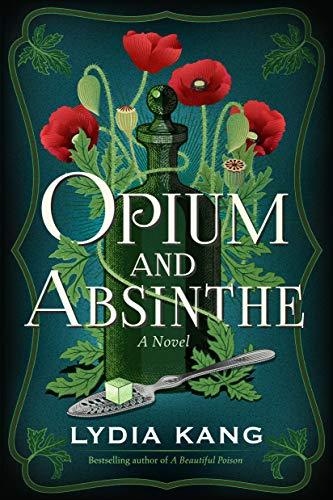
Synopsis: From the bestselling author of A Beautiful Poison comes another spellbinding historical novel full of intrigue, occult mystery, and unexpected twists.
New York City, 1899. Tillie Pembroke’s sister lies dead, her body drained of blood and with two puncture wounds on her neck. Bram Stoker’s new novel, Dracula, has just been published, and Tillie’s imagination leaps to the impossible: the murderer is a vampire. But it can’t be—can it?
A ravenous reader and researcher, Tillie has something of an addiction to truth, and she won’t rest until she unravels the mystery of her sister’s death. Unfortunately, Tillie’s addicted to more than just truth; to ease the pain from a recent injury, she’s taking more and more laudanum…and some in her immediate circle are happy to keep her well supplied.
Tillie can’t bring herself to believe vampires exist. But with the hysteria surrounding her sister’s death, the continued vampiric slayings, and the opium swirling through her body, it’s becoming increasingly difficult for a girl who relies on facts and figures to know what’s real—or whether she can trust those closest to her.
Epic Fantasy
Scarlet Odyssey by C T Rwizi, Pages: 534, Publication Date: 1 July 2020

Synopsis: Magic is women’s work; war is men’s. But in the coming battle, none of that will matter.
Men do not become mystics. They become warriors. But eighteen-year-old Salo has never been good at conforming to his tribe’s expectations. For as long as he can remember, he has loved books and magic in a culture where such things are considered unmanly. Despite it being sacrilege, Salo has worked on a magical device in secret that will awaken his latent magical powers. And when his village is attacked by a cruel enchantress, Salo knows that it is time to take action.
Salo’s queen is surprisingly accepting of his desire to be a mystic, but she will not allow him to stay in the tribe. Instead, she sends Salo on a quest. The quest will take him thousands of miles north to the Jungle City, the political heart of the continent. There he must gather information on a growing threat to his tribe.
On the way to the city, he is joined by three fellow outcasts: a shunned female warrior, a mysterious nomad, and a deadly assassin. But they’re being hunted by the same enchantress who attacked Salo’s village. She may hold the key to Salo’s awakening—and his redemption.
Children’s Picture Book
Kat and Juju by Kataneh Vahdani, Pages: 40, Publication Date: 1 July 2020

Synopsis: An unlikely duo star in a charming story about being different, finding courage, and the importance of friendship in the first book in a new series from an award-winning animation director.
Kat likes doing things her very own way, but sometimes she doubts herself. So when a bird named Juju arrives, Kat hopes he’ll be the best friend she’s always wanted. He’s outgoing and silly and doesn’t worry about what others think—the opposite of who she is. Bit by bit, with Juju’s help, Kat discovers her strength, and how to have a friend and be one—while still being true to herself.
*** Which book will you choose? I chose “Opium and Absinthe” as soon as I saw the cover I knew that was this book I had to choose. Let me know which book you choose. ***
#amazonfirstreads#amazonkindle#amazonprimemembers#bookclubfiction#books#childrenspicturebooks#contemporary fiction#epicfantasy#goodreads#HistoricalFiction#Kindle#Kindlebooks#mystery#suspense#thriller
1 note
·
View note
Text
Memory Lane
Fandom: Assassin’s Creed Odyssey
Ship: Kassandra/Daphnae
Words: 3549
Summary: Before her fateful meeting with Layla, Kassandra took a trip down to a museum.
A/N: This was long overdue to be posted because after working on this for about a month, I forgot to do the thing so this is at least three weeks late. But I still like how this turned out so I’m posting this now before that feeling goes away and I work on it again for the third time, I hope you all enjoy reading this.
[AO3]
It’s only been a week since she arrived with a very few of her belongings, but this was the first she had ever stepped out from her hotel – her room– and it was quite a stormy day in Ancient Thera or, what is now known by many, modern day Santorini. No longer were there any dirt roads where the air was easier to breathe in without the smog; simpler time where people walked about or rode on their horses. So much has truly changed over the two millennia—so did she, too, have changed.
Throughout hundred and thousands of years, she had traveled far and wide when there’s nothing left for her in Greece; the time when the names of the old gods and stories she grew up with were being forgotten. She been to many places, witnessing what this world has to offer her and there’s no parts of this world where she hadn’t been to before, untouched by her steps. But there are still places Kassandra never expected to find herself at: a museum.
There’s a first time for everything, like in this case.
After shaking her head and declining to take the change of money she now doesn’t have any need for, Kassandra flashed the clerk a charming smile as she leaned forward and swiped the ticket off from the woman’s hand whose face started to turn red. The young woman started to turn her eyes down to her hand where their fingers brushed against one another then looked back up, stiffed on her own feet. She did her best to maintain composure when this finely dressed woman whose face seems to have been molded by the gods and a body chiseled by the heavens offered her to have a pleasant day, thanking her too late when the well-dressed woman was already gone.
It was wrong of her to teased like that, but Kassandra’s was still swelling up with pride as the very corner of her lips began to twitched upwards in a slight smirk. She dripped with confidence. ‘I still got it.’ She thought to herself while finally striding into the warm building after her ticket has been scanned. Her gaze was immediately transfixed on the marble statue of Zeus who stood tall and in the middle of the lobby, towering all those who were walking about with his eyes piercing at them all. There was an eagle perched on his shoulder with its wings spread out, one where she couldn’t help it but to feel a small ache in her heart when the bird reminded her of Ikaros who has passed a long time ago. And while the statue was a marveling sight, it doesn’t compare to the one that once stood on Kefalonia.
Slipping her hands into her pockets, Kassandra looked around for a moment before she shrugged her shoulders, walking into the first exhibit that caught her interest. “Ancient pottery.” She said to no one.
It was fairly empty, quiet even—well, except for the handful of school children running amok while their exasperated teacher tried to calm all of the kids down. She might’ve been tempted to help if it weren’t for one of the students getting sick, vomiting all over the floor; it’s best if she does not get herself involve, one of the reasons why she doesn’t have kids of her own.
She went back wandering around on her own, however it wasn’t long until she ended up following a group of tourists who all doesn’t seem to mind the terrible weather that was currently happening outside. She stood at the far back, not wanting to draw attention on herself as they were all shown artifacts that have been dug up. Unfortunately, many of them were just…good replicas. If only she could pity them rather than finding humor in this, many of these said relics have been long lost or destroyed by the Romans while others have been sold in the black markets.
Luckily, she managed to keep several with her, hidden away in a storage unit. She left the location for Layla back at her apartment in Sparta, the closest thing she can call home.
Kassandra took a few moments longer to admire the false relics being displayed before striding to the others, in time to hear the tour guide telling tales of influential figures; the likes of Perikles and Socrates, how their legacies can even still be felt in today’s society. She bowed her head down so others won’t notice the fond smile that came crossing her features, remembering those two all too clearly despite the fact that it has been thousands of years. She still remembered those she’d met, their faces still fresh in her mind. However, it didn’t take long for her smile to turn into an annoyed scowl when the tour guide shifted the story to Aspasia. ‘Fucking maláka…’ It was unfortunate that history won’t know the truth about that traitorous snake.
Just before that familiar and old rage could take hold, Kassandra felt warmth suddenly surging up in her arm, feeling chills going down her spine. Looking down, she sees the Staff of Trismegistus, disguised as a watch, taking on a dim glow only she noticed. She knew what this means: her long awaited and fateful meeting with Layla, at last. As she was about to make her leave, she suddenly stopped in her tracks and stood rooted on her spot when the tour guide told another story, a story she was familiar with…
The legendary and mighty Eagle Bearer.
“Eagle Bearer?” one of the tourists said, sharing the same perplexed looks the other tourists were exhibiting. It was obvious that none of these people have ever heard of the name that was once so infamous, striking a mixture of admiration and fear. They’re all unaware of the owner of that name is currently with them, listening closely. “Who is that?” The tourist asked.
“A misthios, or a mercenary,” the tour guide answered, “who traveled throughout the Greek World during the Peloponnesian War – playing on both sides, I should add – taking on the tasks that not even the bravest of men would dare to take.”
“Why were they called the Eagle Bearer?”
“They say an eagle, sent by Zeus himself, accompanied the misthios during their journey.”
Kassandra refrained herself from having to fact-check the tour guide. Ikaros has always been with her.
Questions from the others came at an instant, pouring out from each and every one of them. Their hands were raised up with an eagerness of a child, clear interest written all over their faces. Sadly for them, many of the questions that have been asked went unanswered for the tales of the Eagle Bearer have been lost and many experts aren’t sure if they ever exist; another myth.
“But there's still one story that has been apparently proven to be,” the tour guide said, pausing for a moment to make sure she had gotten all of their attention, then continuing soon afterwards, “the tale of the Eagle Bearer…and their lover, Leader of the Daughters of Artemis; a devoted and proud follower of the Goddess of the Hunt.”
Kassandra’s world came to a sudden halt, eyes widening. ‘Daphnae…’ She felt the air in her lungs leaving, leaving her breathless as her chest started to tightened. She thought both of their history and names have been washed away and forgotten, but then again, the relationship wasn’t a secret and it didn’t stop the Daughters from whispering. Perhaps it’s an excellent time for her to go now, however she stood rooted on her spot and unable to willing move, rather she listened closely.
Throughout time, many stories and tales have all been greatly exaggerated as time went by like in this case. She did not remember an epic battle occurring between herself and Daphnae when they stumbled upon each other, a battle that supposedly lasted for days. ‘Do people really thought that actually happened?’ Then again, this was something others from a long time ago would have said as well. People truly haven’t changed much.
But there was one thing that was true…
She remembered how it felt when her eyes laid upon on the beauty, a wave of desire drowning her and pulling her deep into those gazing dark eyes of the huntress’s—alluring. It didn’t take long for their shared attraction to turn into something more, something deeper and more meaningful.
“After their worth has been recognized, a series of trials was given to the Eagle Bearer: slaying all eight legendary beasts.”
Maláka. Another memory, one that was more on the unpleasant side; fighting against those beasts was difficult and that boar…the fucking boar that farted constantly…shuddering at the thought, oh how its smell still lingers in her mind. But by the gods, it was still worth it at the end, those bloody cuts and bruises she sustained was all worth it just so she can see Daphnae again.
“Beast Slayer, it’s so good to see you again.”
“It was said that the Eagle Bearer would spend the night with their lover upon each of their return, presenting the huntress with the beasts’ pelts.”
Lips finally meeting one another, armor and pieces of fabric were hastily casted aside as though it had been eternity since they last saw each other. The desperation in both of their tones was clear, hands roaming all over each other, touches that were familiar to them both. And as they were both on the ground with Kassandra on top, giving her a wolfish grin before she started kissing her way down, finally.
This was something she often dreamed of and fantasizes about: the sweet, sweet taste of heaven.
Kassandra could still remember every passionate night they spent together under the bright moon and shining stars, every ecstasy-filled moment they shared by the fire, how could she ever forget? Especially with those lustful looks Daphnae would always give her, but perhaps the only thing she didn’t miss much was the huntress’s strong grip—very strong grip.
Her hair felt like it was going to be ripped out from her scalp within any given moment, but it’s still worth it at the end just to hear Daphnae’s cries of pleasure, visibly grimacing when Kassandra felt another hard tug. But she didn’t let the pain stop her from relentlessly moving her tongue between Daphnae’s wet folds.
A deep rumbled left her chest as she held Daphnae’s hips down, preventing the other woman from squirming around so much, pushing her face forward as her tongue drove in deep. It delighted her to hear the huntress moaning loudly into the night. And it fueled her.
Her eyes were shut as memories kept flowing back into mind, remembering those nights when her name left Daphnae’s lips—crying her name out like a prayer.
“Kassandra!” Hearing that final cry – tasting her fully – Daphnae did know how to make her feel as someone who’s more than the Eagle Bearer, more than another weapon for the cult. The feeling of belonging she never truly felt, not even when she was just a little girl back at Sparta.
Time with Daphnae was nothing but short-lived, finding herself feeling regretful for being away far too often and how peace is nothing but a privilege, how it never lasted long enough for them both to watch the sun rising together. Always leaving before Helios could ride his Sun Chariot to bring about a new day.
“I have to go now.”
“I know.”
“So…what happened next? What happened when they completed their task?”
There it was – her eyes slowly opened as she took in a deep breath, pulled out from her memories and back into reality – that dreaded question. She would do anything to forget that.
“When the final beast has been slain, the Eagle Bearer was sent to Chios – home of the Daughters of Artemis – for their test was not yet over; a final task,” the tour guide said, placing a hand on her chest for a more dramatic effect, “but it was a task they couldn’t go through.” She said, letting out a heavy and tragic sigh.
“The task of killing the one you hold closely and dearly to your heart.”
The tourist who asked the last question scoffed loudly which caught the attention from the others, rolling his eyes when they all looking at him now. “Weren’t they like…an assassin?” He said, arms crossing together and was completely confused by this. After all, weren’t all warriors supposed to be badasses? And this figure in the tale sounded like they can have anyone else they wanted.
“It’s not as easy as you would think,” the tour guide said, rolling her eyes. This wasn’t exactly the first time she had to deal with men who were like this.
“Wasn’t killing part of their job?”
“Could you do the same then? Killing someone you loved?”
That got the tourist stopped talking, moving his head to the side as his cheeks turned into a lovely shade of red from embarrassment when all eyes were on him all the while he wasn’t aware that the Eagle Bearer herself was gazing at him piercingly. “No…” He said, sighing heavily; he could never even bring himself to yell at his own beloved dog back at home.
“And with the Eagle Bearer’s inability to go through the final task,” the tour guide said, finally able to continue the story, “a rift was formed between the two.”
“But did they ever make up?” someone else asked, raising a hand up.
“I don’t know, no one knows unfortunately, the story just ended there,” the tour guide said, “but I like to think they did.”
A sad smile appeared on Kassandra’s face, wishing that were the case. In reality, their paths never crossed again. A constant reminder plagued her after that doomed meeting she had with Daphnae, coming upon a group of the Daughters of Artemis or gazing upon the statues of Artemis, gazing at the goddess with contempt. It wasn’t only until she finally got to see the huntress again when time and the years has caught up to her, death claiming her soul peacefully; watching her body burn at the very next day from a safe distant.
“Okay!” the tour guide exclaimed, her mood brightening up again while clapping her hands loudly together to get the others’ attention. “We’re now moving on to ancient potteries, follow me!”
The tourists all oohed and excitedly followed their guide with the story of the Eagle Bearer quickly forgotten.
Kassandra, on the other hand, found no offense at the sudden change of topic. She turned simply and left the museum without having anybody else noticing her presence was among them. As she stepped out, it was still raining heavily and she could hear the distant thunder booming in the sky, not bothering to bring an umbrella in the first place. She smiled sadly as her thoughts drifted back to the woman who broke her heart. It has already been so many years and there hasn’t been a day where the pain went away...still, it gets easier with each passing day. After all, her time is up.
‘Wait for me.’
xxx
So this is what it feels like to die.
After the Staff of Trismegistus was passed off to its new owner, the effect was immediate to take a hold of Kassandra when she lost her balance and started to stagger. Her body ached, could barely move around as her vision blur and didn’t notice Layla caught her before she fell onto the ground, cradling her closely. Memories flooded her mind like waves, wondering if this is what many others had said when they say every second in your life starts flashing before your eyes. However, unlike most people, she wasn’t afraid to finally greet death.
She lived a very long life.
But it was still a good one…a good life she had.
She remembered the very first time she left Greece after she helped the Greeks to fight against the Romans, but even with her prowess wasn’t enough to stop them. Everything was left behind when she escaped with the others—her home, her legacy, and all the memories she held dearly, all gone in the fire and leaving only ashes in its wake. Afterwards, Kassandra lived in the shadows, staying hidden and not to involve herself in fights that others can handle on their own.
She had seen the rise and fall of many empires before another would rise up to take its place, then the vicious cycle repeats itself. She had seen societies joining together as one, fighting against an unjust. At the end, when the dust has settled and freedom was returned to the people, greed never failed to cloud one’s judgment. The world hasn’t change much, leaders of this so-called free world were no different than the kings and queens, emperors and empresses. This world is still standing divided and unity is nothing more than a laughable dream. And even after all these years, the long life she lived, her only regret was that she didn’t do much to help make that change.
As her breathing continued to labor and her vision grew hazier, Kassandra’s thoughts were on her family, the family she brought back together and friends she made…then having to watch them all grow old and die. Once more, she was all alone in this world.
Her mother was the first to go, just a few years after the family has finally became whole again. An illness had overtaken her, something that shocked them all. A shock turned anger on Kassandra’s end, cursing loudly to the night and the terrible fate her mother must endure…and how truly cruel the fates are. She felt nothing but helplessness, a cure that’s never discovered until decades ago. Her mother deserved a better ending to her story, but Myrianne already made peace with herself a long time ago, knowing that everyday life is fleeting. And just with that being said, Kassandra had accepted the fate that was bestowed upon her mother.
A year later, Myrianne died in her sleep. Surrounded only by her family and people she’d met over the years of her journey came by to pay her one last respect. Kassandra never realized how loved her mother was until everyone who knew her crowded in the same room.
Alexios, her younger brother, followed mother a year after her death. Kassandra doesn’t know the cause of it, but she suspected the Cult of Kosmos had something to do with it. After all, they were the ones who poisoned his mind since his infancy, they have abused his body, treating him like a rabid animal, and only using him as a weapon; never human. She knew how he suffered over time and how he struggled to undo what the damn cult had done to him. He tried and fought as hard as he can, but it seems it wasn’t enough at the end. And his body gave out where he was found days later by Spartan soldiers who were patrolling around Mount. Taygetus.
He was buried next to their mother the very next day and Kassandra hoped that he found peace in death.
Nikolas was the next to pass, a death that certainly shocked those who knew him—a death no one would have expected from a renowned general like him. Struck by common, measly thief, stealing whatever little drachma the Wolf was carrying all for a cheap wine. It wasn’t long for the thief to be found, apprehended by Kassandra who returned the favor. Nikolas may have committed atrocious actions, things that she would never forgive him for. Over time, her anger lessened. She’d lost too much, she didn’t need to lose him…someone who was also once so important in her life.
He’s given an honorable burial, wrapped in a beautiful red cloth with his helmet and prized sword, and Kassandra was proud to call him her father.
Finally, there was Stentor…who was the last to die, unfortunately.
She and Stentor…they never got along, even when they’re both stuck with each other once they’re left together. But things between them mellowed after he found someone who tolerates his terrible attitude, Kassandra truly loved his wife though; a complete opposite to Stentor, getting along with her and his children. He died at a very old age, surrounded by his family from what she heard from far away.
She started to think about all of the others she had the privilege to met over the years, people she was proud to call her friends: Barnabas, Herodotus, Phoibe, Ikaros, and many more, but Daphnae was her last thought. To have the huntress in her mind one last time was comforting.
She’s ready to join them.
“Gaía…máter pantós…chaíre…” With those words recited under her breath, Kassandra smiled. At last, she can finally rest with all of her worries left behind, trusting Layla and her team to finish the work she couldn’t complete. And as her eyes fluttered shut for the final time and breathing out her last breath, she heard these final words whisperingly lovingly into her ear as a greeting.
“Beast Slayer, it’s so good to see you again.”
27 notes
·
View notes
Text
These Sheets, Those Shelves, and This Shitty Place (—and Shion)
Shion's warmth is fading from the mattress. Nezumi feels disarmed.
Shion has just finished the Iliad and is going off to look for the Odyssey after Nezumi told him they were related works. What of it?
A loaded exchange between Shion and Nezumi in the library vault on a night before the Manhunt
hello. i finished this after my birthday so of course i wanted to update the shion/nezumi birthday fic, but this finished itself first so... hehe. >:) anyway, here it is. in the manga and novel, they said that the manhunt came "one day, out of the blue" so i just supposed it didn't immediately happen after that chapter nezumi had an episode and danced with shion to make him stop worrying about him, and i supposed that that didn't immediately happen after they ambushed fura. yes. super wordy and introspective, but i really enjoyed writing this. i hope you enjoy reading it as well!
6.6k+ words on ao3 or Keep Reading!
Nezumi whistles, not looking up from his book, not even when he feels Shion stirring beside him. "You sure about that?"
"Yeah," Shion answers from the other side of their bed, "I'm sure there was a copy when I organized all our books."
‘Our books?’ Nezumi twists himself towards the wall on his side of their bed, away from the rest of their room, having to raise his book slightly to keep his shadow from covering words he hasn't been registering. "Good luck," he mutters as courtesy, not meaning it but earning a response from Shion anyway,
"I'll go check right now."
Shion sits up. It's with much effort that he lifts the blanket off of himself, body quick to protest the loss of direct warmth from Nezumi. It's for this sole reason that Shion considers not leaving anymore. But shortly he's able to reason that he already has half of all the books over there in his mental catalog, and he already knows how to maneuver around this general area, knows it like the back of his hand; he won't take too long.
Shion dangles his legs off the bed, with less effort now, peering down at the floor. He reaches for each of Nezumi's slippers by stretching his legs, using his toes to turn one over and using his heel to drag the other closer. He shifts all of his weight forward and stands, every movement careful not to disturb the mattress nor Nezumi.
Nezumi doesn't mind it. He just eyes the same line on the same page for the nth time. He comes close to giving up altogether; on top of not having been able to read in silence all evening, Nezumi is becoming thoroughly distracted now that Shion is continuing,
"I'm just not sure where I categorized it under." Shion's padded towards the shelves, looking through the sections, blinking slowly to connect his rote memory to this overwhelming reality. He has an urge that he holds: the urge to comment, again, for the nth time, on how amazing this place is, by the sheer number of books housed within it; he feels the same immense sense of curiosity now as he did the first time he'd entered here, books piled up high on the bed and the couch and the floor and every other surface in the room. That they're organized now doesn't change how his heart beats with excitement every time he thinks of how many stories there must be here to read and learn about, how much of all of it makes up the boy he saved four years ago. He only goes on now, "Besides, Nezumi..."
"What?"
"You wouldn't help me," Shion mumbles, content with skimming his fingers along rough, old spines, each hiding yellowed pages that held words and worlds he's yet to explore. "It's why organizing all the books took longer than I wanted."
"Don't complain," Nezumi complains, chides, switching his book over to his other hand, "you're the one who volunteered to do it." He's positive they both remember clearly, even if it was several months ago:
'It'll take a hundred years—' 'I'll do it in a week!’
"I did," Shion agrees instantly, though it took a week and a day. He shakes the thought off, crouching down to look from the bottom shelf up. "But it would have been nice if you helped me decide whether to catalog them by author, year published, title, or genre—"
"And? Where would you have put it if I told you I wanted them arranged by author?" Nezumi challenges, "You didn't even know who Homer was yet at that point."
"Well," Shion replies, still scanning the titles. "I do now—"
"No you don't," Nezumi cuts in. "I don't even know who Homer is. Actually, no one knows who Homer is."
"...What’s that mean?"
"The problem with all these epics is that they're so old no one even knows who the hell actually wrote them or where the hell they actually came from anymore. Was Homer a bard who ran around singing epics for money and fun? Was Homer a bunch of poets coming up with stories off the top of their heads at a symposium? Was Homer an entire country that wanted to decide on an origin story once and for all? And did Homer even exist to begin with? In reality, there's a huge possibility that Homer's epics have been edited a handful of times by different people from different times. And remember, this was ancient, a point in history when they'd just started actually writing stuff down, and by then the story's already been no less than a hundred years old..."
Shion didn't seem to notice when exactly his gaze drifted away from the books, to fix itself on Nezumi's figure: his untied hair, his steady back, the fingers poised gracefully to hold his book to the wall. All Shion knew was that he was hanging on to every one of Nezumi's words with wonder. See, when Nezumi spoke, nothing else in this room mattered to Shion except him.
When Nezumi's trailed off for a moment, a thought— several thoughts— wedge themselves in the back of Shion's mind. As he processes the cognitive overload from ideas he's never once imagined in his life, especially having never been exposed to the topic at hand, heavily discouraged from pursuing the arts and humanities in No.6, he's led to a related feeling: annoyance...? or something akin to it.
Any memory Shion has of anyone talking this much was of the students in his grade of elites— err, the one he was kicked out off for 'poor decision-making skills.' The kids in that class always talked about their own specialties like they knew it all.
And with No.6's education system, really, it wasn't unlikely that they did know it all. But more than that, they talked like they were the only ones that mattered. Of course they would feel that way as citizens born into a special status that promised them lofty quarters to rest and relax in, endless electronic resources for elaborate self-study, and overall sophisticated houses that fit their lifestyle perfectly. This education, providing for the maximum ideal conditions for growth and development, ensured that students will know it all.
Shion recollects that even Safu found ways to fit her specific neuroscientific register and vocabulary in everyday conversations. But to him she was never annoying, he never felt spoken over. She was slightly, slightly awkward, a little rough around the edges towards those who made fun of the way she dressed, and she didn't know how to pause for breath when she lectured Shion on hormones and their consequent bodily reactions— but she only ever sounded passionate, never like a know-it-all; she didn't speak just to gloat about how much she knew or boast her special status as the high-class citizen she was.
Additionally, Safu was actually talented. Shion has been turning it over in his head for a while now since the time he was evicted from Chronos, because it hadn't felt all that different: had he actually been talented himself or did he just luck out getting top scores in his early assessment? Developmental cognitive studies is as far from his own ecology major as emergency medical procedures, but if he were able to perform an impromptu suture-surgery on a bullet wound by memory of one video at age 12, he guessed there was a high chance that he wouldn't be wrong to assume that an aptitude exam taken at age 2 could hardly be reliable especially the older a subject gets.
In the least, even if Shion weren't talented— and by no means does he have any misgivings coming to terms with this— he was never at risk of flunking out from the special course. Maintaining grades in the special classes wasn't exactly easy, and he saw a handful of other classmates leave for unsatisfactory performance, but if he focused enough it was a breeze. Still not as talented as Safu, though. And besides, he flunked out of the special course regardless, just for his own reasons.
As he helped his mother pack up their things from Chronos to prepare for the tedious move to Lost Town, Nezumi's words made carved deeper impressions in Shion's mind and gave his feelings a tact that helped him realize how out of place he'd felt all along at the very top with the smartest kids in his grade. His plain, humble times with Karan at Lost Town didn't make him feel any less dignified or any less real.
And even as he jumped out of the Security Bureau's remote-controlled car and tossed his official citizen ID to keep moving, keep running (and swimming) to find himself here in an underground library vault in West Block, Nezumi's words materialized and Shion could finally fully grasp them:
'Petri dish elites' was on-point, is exactly what they are, what Shion used to be— brought up and pampered in artificially perfect environments to be reared and controlled exactly as they should.
But in Lost Town and West Block alike, especially here in this room— in a place that experiences the real impacts of fickle weather and he has to either turn the heater up or scoot closer to Nezumi to make it through the night without his teeth chattering the entire time, in a place where he's free to pursue any book he wants to read on any topic, whether scientific or literary (but mostly literary) and learn about heroes and dramas and tragedies— a place he can call his starting point, Shion realized that human beings needed much less than the luxuries in Chronos and in No.6 in order to live a content life.
With little to nothing but the clothes on his back, with Nezumi and the library and this bunk they share, Shion feels like he has everything he could ever need.
Shion wonders how Safu would react if he said that to her.
It's because I left No.6... He comes up with the words in his mind, as if addressing them to Safu, that I discovered what kind of person he really is, the very reason I didn't get to push through with the special course. That I discovered what kind of person I really am. It's not a walk in the park, but... I don't regret meeting him, or following him, or staying with him. In fact... he's just like you, in a way.
He could almost hear Safu's voice, pretend-condescending but undeniably sweet, What are you talking about, Shion?
Shion closes his eyes. What was he talking about?
Safu and Nezumi may speak on relatively similar levels of enthusiasm when it came to things they're knowledgeable about— whether it's neuroscience or literature— but there's no way Safu and Nezumi are alike, not even at the base level however he cut it.
Nezumi never spoke warmly, or cheerfully, or looked at Shion like he was the most wonderful part of his life. Nezumi's words were always cold, edged, and quite frankly he looked down on Shion more than anything.
Shion treasures them both, though. That's about all they may ever have in common. He would do anything to keep them both in his life, protect them at any cost.
Shion recalls vividly the sensation of Nezumi's fingers interlocked with his, and he's able to calm down the extreme anxiety that rises in his chest with every thought he gets of Safu these days.
The only way he's able to stand his ground knowing Safu is currently in danger is by Nezumi, the faith he has in the plans they have to go save her themselves. The waiting is just part of the plan. And it's a huge part of the plan— if he breaks by utter tension now, it's all going to be for naught.
So Shion takes a deep breath for the time being, lends himself to the soothing feeling of being here, falling for Nezumi. He's able to smile as he opens his eyes to look through the old books again, listening not to his haphazard, discomforting, annoying thoughts, but to Nezumi.
"What I'm trying to say is, authorship for the really old stuff is quite the controversial thing. And from the start, it was a no-go for you to arrange them by year published either. I would suppose that even the greatest libraries still have no clue about everything to this day," Nezumi is explaining. "Hear me, Shion? Get what I mean?"
"I get it," Shion hums, "somehow. And there's no appeal to having just arranged everything alphabetically, right?"
"Right, exactly."
"Right," Shion nods to himself, "exactly."
"So?" Nezumi prompts again, "Where do you think you would have put the Odyssey?"
"Well, if I knew everything I know now," Shion starts, sounding a tad bit dramatic as he gets back on his feet, stretching away the strain in his legs from bending his knees for a second too long. "I might've just put it under classics with the Iliad. How would I have known the Odyssey was a sequel?"
"A spin-off, technically— but fair enough. I don't think there was any way you could've known better before anyhow."
"Yup," Shion concedes, casually, unafraid to admit he didn't know; he likes to believe that he's entirely past the shame of knowing less than he ought to when it comes to things like this. "Even now, I still hardly know anything about literature. Can you cut me some slack?"
Nezumi shrugs his shoulders. He folds the page he's been stuck on and sets his book down. He rolls over away from the wall, arm unconsciously falling forward to feel Shion's residual warmth on his side of the bed. He glances at the copy of the Iliad Shion's left behind before finding that Shion's disappeared into the space between the other bookcases. "Since I'm feeling generous," Nezumi simpers into the pillow, "fine."
While it's a topic close to Nezumi's heart for various reasons, he can't fault Shion for his naivety if it's not about the hideous workings of this world or the nihilistic cruelty of reality. Tonight, there's no need for hostility; he wouldn't let Shion make excuses for anything else.
"I will cut you some slack."
"Thanks," Shion answers from a far corner of the library, voice muffled from being absorbed by the volume and volumes of books.
"I gotta say though, Shion," Nezumi calls, raising his voice if only slightly to reach Shion from the bed and beyond the first shelves across the room, "You finished the Iliad in three days. I'm surprised."
"I don't know," Shion chuckles sheepishly, voice automatically adjusting as well, "Once I was past all the language in Shakespeare, other things seemed a little easier to digest."
"Ooh," Nezumi moves onto his back, looking up at the ceiling and picking up Shion's book instead of his own. He raises it above him, makes a show of fanning through the pages elegantly, to no one in particular, perhaps to himself. With his arms outstretched and dust catching in his shirt sleeves, he idly muses that there was always something so calming about flipping through these pages this way. His eyes fall closed in relaxation, lips curling in satisfaction. "I'm impressed. So Your Majesty truly is a fast learner."
"Why," Shion sings, from another corner of the library, "my most trusted liege Nezumi, was that praise?"
Nezumi's eyes shoot open at the comment, he freezes— had he really just praised Shion? His fingers are clutching at the book now, and he has to physically stop himself from using it, open and dusty, to cover his face.
Instead, he feigns plaintiveness despite knowing Shion hadn't seen his reaction, doesn't even turn his head. He closes Shion's book carefully and puts it down beside him, shifting to sit by propping himself up on an arm.
Shion's warmth is fading from the mattress. Nezumi feels disarmed.
Several thoughts occupy his mind, faster than any of the words he's given up repeatedly trying to take in all evening, and they're all about Shion.
Easily, effortlessly, expectedly, all he can think about again is Shion.
Nezumi licks his lips, trying to decide what to quip about first, which to scoff at and make a snide remark on, to save himself from this disarmed feeling that he absolutely hates: that Shion just sang-song an obvious attempt at a comeback, that the book by his hand lay perfectly flat and even, or that these sheets, those shelves, and this shitty place will never be the same again—
Shion, his voice, it has a specific quality: genuine-sounding and engaging, modulations mice and children alike have grown fond of listening to for a reason or another. If he just learned to project and animate that pathetic monotone Macbeth wouldn't have to roll over in his grave— that's what Nezumi used to think. But just now, Shion's response, it was sanguine, true to character: a one-liner that undoubtedly matched Nezumi's well-rehearsed effort to play with him this king-vassal ruse.
Nezumi lets his mind wander in that direction— when did Shion learn to act so well? It was probably a fluke and nothing more, but a part of Nezumi wouldn't put it past Shion to just learn how to do it even if they'd both agreed that he wasn't cut out to play roles he's not suited for in the least. He contemplates what kind of person Shion is, and arrives to some conclusion that if there were any book on theatrics laying around here— not unlikely, by the way— Shion could just practice as soon as he knew the theory, and he could probably do it that way with technically anything.
Along with Nezumi's mind, his hand wandered, too, seeking more of Shion's warmth before it fled the sheets completely. Finding not nearly enough anymore, his hand settles back on Shion's book, pads of his finger flipping through the corner of the pages. Nezumi's mind settles here, too.
Shion has tons of quirks but among those that intrigued Nezumi most was how, as he read along, Shion would unfold any dog ears Nezumi's left in the book from whenever long ago he'd read it. Nezumi adored these books but that didn't keep him from vandalizing them, folding pages to mark where he left off, or underlining or encircling or boxing lines he liked to revisit, writing his own footnotes wherever there was space. Shion, though, did none of that— he would turn these pages so gently that even the dust wouldn't shuffle. He wouldn't even use a bookmark, that boy, he would only memorize which page number he was last on, then pick it up from there next time.
If Shion had extra time, which he always seemed to have on top of meticulously washing Inukashi's rental dogs or shopping for bargains for low-tier groceries for him and Nezumi, he would sit down with his book and read, smooth out the old folds, fix up any tears with some clear tape, and remove those pencil markings while he was at it.
'I mark those for reference, you know,' Nezumi had confronted him once, recently, when he caught him fiddling gently with a worn copy of Tristan using an eraser. 'Well, if you ever need a line for anything,' Shion returned, airily tapping his temple with his pointer finger, 'It's in here now. You can just ask me.'
Nezumi remembers snorting to ask if he was showing off, so this is the brain of an elite, huh? But Shion only chalked it up to mental exercise, said that if he had the Correctional Facility floor plan with its numbers of steps and angles of exposure and vulnerability crammed on its own in his head, he would lose it. And besides, he's done all this since coming here to begin with, earnest in his quest to learn about Nezumi and take him in through these books. So it happened, that every book Shion touched, though visibly aged and still dust-laden, sat nearly as flat and bound to its spine as it was the day it was printed.
Nezumi straightens his back now.
He vaguely recounts his grandmother's words, 'Never sigh for anyone.' She also used to tell him all the time, that this chamber had everything he would ever need.
It was only after she was gone and he'd barely managed to get back here alive that he started to learn that they were loaded words— words that seemed to mean more than they did the last time he thought of them, each time he thought of them.
Not sighing for others meant fighting for himself and himself alone. It meant doing anything it took to keep himself alive, coming in and out of every ordeal with new ways to survive if only for another week longer, another day. Nezumi was to sink his teeth into his lip and silently prowl anywhere he can fit, steal from the unguarded but never take more than he needed.
And on days there was absolutely nothing to take from anywhere, places even his mice couldn't loot for the barest minimum, because that's just the kind of place the West Block is, he could retreat into this room.
This room, dark, quiet, and underground, was secure, a safe haven.
Not sighing for others meant crying for himself and himself alone. It meant doing anything it took to keep himself sane, and Nezumi, half-delirious from hunger and a fever, would reflect and realize that they were true, his grandmother's words: this place really did have everything he needed.
Here, he could pick a book, a story, a line to lose himself in, keep starvation at bay by occupying himself with all kinds of tales told on paper. Here, he could practice sighing and soughing, for those characters and their tragedies, but never still for anything or anyone else. Here, he would learn about the simplistic tendencies of the human, their sensibilities, their desires; Nezumi was to smirk and whisper, grant the weak-willed's wishes with choreographed sweet nothings.
And here, he would learn that which was his sure salvation from cold, hard poverty— Nezumi was to learn how to sing. How to let lyrics flow from his mouth and ride the wind that steals away suffering souls, and how to let scripts live through him to thieve the hearts of other humans by enchantment.
Nezumi was to never sigh again.
The thought came over him as he caught himself sitting motionless with baited breath— he was about to sigh again. He's lost count of how many times he's sighed in the last few months, lost count of how many times he's fought and cried but never just for himself or these stories.
Nezumi can't even remember the last book he finished. He had an extensive, unorganized reading list, and on his off-days from the playhouse he would lay in bed the entire time and bury himself in his mountains of books to read to his mice.
But now, distracting him from ever finishing another book, someone has stolen his attention— someone who took this place over by reading to the mice, organizing all the bookcases, making this bed every morning, keeping him warm.
Shion has been like the sun, full of light and life and warmth, and when Nezumi is with him he feels real, and alive— Living people sure are warm.
When they conversed, even when Nezumi had little to no idea where on earth Shion got what he's saying or how the hell he has the guts to be saying them at all— naive ideals, bare confessions, words of irrefutable hope and love— Nezumi felt real, and alive, so alive, that for the first time in his life he had more than himself and fiction to cling to.
Whether harsh debates or playful banter, it was accompanied by stale and moldy bread, meat a day away from rotting, water heated in an old kettle— and Macbeth soup, on relatively better days, like either of their paydays from giving dogs baths and putting on shows in the theater— and they've never quite felt like luxuries before, just the bare requirement not to starve to death or completely go insane. But that he had Shion's company over shamefully cheap dinner made him ignore orders from his grandmother never to sigh, and instead Nezumi would agree with her other words, with all his hesitant heart, that this chamber—
—these sheets, those shelves, this shitty place—
(—and those ignorant, innocent words, and that light that stubbornly, incessantly shone through— and Shion—)
—is all Nezumi would ever need.
And while during these days Nezumi experienced several episodes of emotional unrest, somehow he couldn't help thinking that these have been the most peaceful days of his life. Even if there were less air to breathe in this cramped vault, less room to move on this single-size bed, less surface area of this cheap blanket to put over his scrawny body, there was also less fuel and tinder used up to keep the kerosene heater lit, less nightmares or sleepless nights to be had, and less cold mornings to wake up to.
Life like this is comfortable.
That Shion would come back and slip under these sheets after fiddling and twiddling around those shelves to retire with him in this room— as has become routine— is comforting to Nezumi. Life like this, with Shion, is all Nezumi would ever need.
But the warmth that spreads through Nezumi's chest at the thought freezes over instantaneously, unnaturally; it becomes a sharp sensation stabbing at his lungs and his heart— these peaceful, comfortable days can't last.
These sheets, those shelves, and this shitty place—
—and Shion—
Nezumi suddenly feels uncertain if he's willing to wager all of this; it's the same feeling he got when he decided by himself to gather information how-many monthly paychecks' worth to get as far as he can without involving Shion and his reckless tendencies, the same feeling of grudge against salty tears forcing their way out of his eyes after clueless, inexperienced lips touched his for the very first time only to kiss him farewell, the same feeling when he held the trembling hand that struck his cheek and he had to swallow any doubts he had and keep them down, for his own sake and Shion's.
The Manhunt is going to happen soon, so soon Nezumi can feel it in his bones, and however much he wishes to deny that these past few day have felt like he was desperately living out the remainder of this peaceful, comfortable life, it doesn't matter. The reality of the situation is that this waiting it out is part of a plan.
Nezumi had come up with this plan— a plan with a chance at success so low that this risk shouldn't even be worth considering, even if they've maxed every factor on their side— but he had to continue keeping those doubts down, believe in his own plan, promise they would make things work out, to preserve Shion's sanity, keep his spirit alive, protect his smile.
Now isn't the time to waver.
Now isn't the time to waver, Nezumi knows, but even at present, on a nice, friendly night, he's beginning to yearn for these sheets, those shelves, this shitty place, and Shion—
"Sorry, it's not a tragedy this time. But did you hear that? Nezumi praised me."
It's hearing this gentle exchange that jolts Nezumi right out of his thoughts and back to reality; he's so startled by Hamlet's chirp and shuffling and Shion's voice that his heart feels like it's on the verge of bursting.
His hand comes up automatically to soothe his chest but when he sees Shion approaching with a copy of the Odyssey clasped tightly in his fingers, a victorious grin on his face, and the flickering orange tint of the heater in his translucent hair, Nezumi slides his hand further upward to hold his nape in an attempt at nonchalance, poorer than before all of these thoughts.
Shion glances at him and in his ears Nezumi can hear his heart drumming loudly and erratically to the sensation of his chest tightening, clenching, wrenching— unsoothed, because his palm has gone elsewhere, covering his vitals to make up for the fact that he'd been so disarmed he's left himself exposed again. He could swear Shion must have seen right through him.
But Shion is only cheerfully treading back towards the bed, and when he's seated on the edge of the mattress toeing off Nezumi's slippers, happily and jokingly mumbling "Even Hamlet couldn't believe that you were praising me," the fickle warmth within Nezumi's chest, or the loss of it, puts the thorns back in his next words:
"—Praise?" Nezumi just might have; following all the sentiment off the top of his mind just now up to this point, it felt safe to say that tonight was one of those nights that he, full from Macbeth soup, felt gracious enough to take the thorns out of his words to give Shion a real compliment. But when he thought about how this night could probably be their last together, even Nezumi can't fight the bitterness that makes him make haste of taking the praise back: "As if." He means to glare at Shion and his profile, but when he sees Shion turning to him he just rolls his eyes and they land on the flat, dusty copy of the Iliad by his hands. "You're just as good as Paris."
Shion is blindly pushing the slippers with his heels, fixing them in an orderly fashion against the edge of the bed next to his own shoes. He tilts his head, unfamiliar with the look he caught in Nezumi's gaze before he broke eye contact to click his tongue.
Shion revisits the words in his short-term memory, unsure of what to make of what Nezumi's just said. But, the tone of his comment was low like his usual scoffs, and the way Nezumi is averting his eyes makes Shion guess the words were meant to offend him, provoke him— yet he finds himself calm and unfazed, neither by Nezumi's words nor by his demeanor.
It would be a grave insult to Nezumi and his praise, whether he meant it or not, if Shion hasn't learned by now how to react, if he hasn't realized that Nezumi's words are never empty. And if he didn't understand them, Shion didn't have to pry or demand or throw some kind of tantrum— he just had to figure it out on his own. He's used to it.
Shion's learned as much in this room as Nezumi has. Perhaps even more.
Less a serious response to what Nezumi said than an offhand answer, he tilts his head, and speaks up amidst the strange tension hanging in the air, "Then you must be Helen?"
"The face that launched a thousand ships?" The delay in Shion's reply allowed Nezumi to regain his composure, and he's able to bring his hand away from his nape and to his chest, no longer aching, only the tips of his fingers touching the cloth of his shirt in a mock-timid gesture. He even manages a smile, sensual and pretty. "What a great compliment. That's so generous of you to say, your Majesty—"
"You know it, Nezumi," Shion interjects, eyes lowering for a moment to imagine touching those sensual lips with his, fleetingly, before looking right at Nezumi, "You could easily be the most beautiful—"
"Shion." Nezumi says this in a tone that warns Shion not to finish that sentence, not to finish that thought. This smile, one he reserved for seduction, worked to derail Shion, but all too well. It's no secret that Nezumi is attractive and that Shion is attracted to him, but if this carries on, Nezumi's not sure he can stay composed. His smile fades along with any emotion in his face and he continues, "Calling you as good as Paris wasn't a compliment."
Shion gets it. Nezumi doesn't want to hear it. He drops the need to tell Nezumi he's beautiful altogether, despite believing it to be the honest truth. He settles for a noncommittal reply instead, throwing in a shrug. "Didn't think much of it, so it's fine—"
"I'm telling you to think about it now, Shion." Nezumi picks up the book and hands it to him, lifting his facade to explain, "Paris could get the power to rule over a huge chunk of the world or the intelligence to fight and conquer any other place he wanted— but he chose a girl."
Shion takes the book and looks to the shelves, deciding by the cold floor and the slippers tucked under the bed that he'll put it back tomorrow. He tosses it gently to the bottom of the bed before pursing his lips as he looks Nezumi over again. "You... You're so cynical."
Nezumi snorts, "Great, what else is new—?"
"Paris didn't choose a girl over power and intelligence," Shion continues without missing a beat. "Simply put, wasn't he just not interested in what Athena and Hera had to offer? Aphrodite, on the other hand, didn't promise just a girl—"
"—the heck are you saying—"
"—Aphrodite promised him the love of the most beautiful mortal in the world."
Nezumi's eyebrows draw together and he finds himself scowling, "What did you say?"
"Paris chose love," Shion repeats, sounding like he had all the confidence in the world to be concluding such a cheesy speech. "Over power or intelligence, Paris chose love—"
"—And ended up waging war on all of Greece? Over such a pointless thing?" Nezumi could say a thousand things about how rotten and obsolete some values portrayed in literature are, especially in the classics, but he only scoffs: "Pretty dumb if you ask me—"
"It's not dumb—!" Shion starts to retort, but Nezumi snides,
"It is!"
Literature held tens and thousands of stories about humans making dumb decisions, and what good was literature if one didn't look past the entertainment it brought to learn from it? Especially in Nezumi's experience, from being smoked out like a literal rat out of his first home by greed-ridden intelligence and merciless power, to having to live in a literal dumpsite where people struggle everyday to make ends meet— Nezumi knew that it was human nature to just take and take and take, graciously receive anything offered to them that would benefit themselves, or seize that which isn't theirs by force if they were rapacious enough— at the very least No.6 was a prime example of this.
And then it hits Nezumi, the realization— it's right in front of him. In front of him is Shion, candid, altruistic, simple-minded Shion, who's barely made a dent in learning about the true, hideous nature of No.6— but for sure, for sure, Shion knows that if he had stayed on the other side of the wall, no, if he had never opened that window and taken Nezumi in, he would be well on his way to becoming the elite he was destined to be, apathetic and oblivious and uncaring but ultimately well-off, sleeping in a luxurious bed complete with plush pillows and duvets, reading and writing theses on ecology as his expertise without having to even lift a finger, and living in a completely technologically equipped mansion designed to give him the best life.
Despite all of that, Shion is right here, in front of him. On these thin, dirty, secondhand sheets, among those dusty, dilapidated, old-fashioned shelves, in this shoddy, dingy excuse of a room. Shion is right here because of him, because Shion was drawn— mind, body, and soul— to Nezumi.
"Sounds familiar, doesn't it? Someone who had immense power and intelligence for the taking..." The words steadily come forth from Nezumi's mouth lacking bite or any trace of derision. He just sounds like what he's stating is matter-of-fact, "...but he chose to run after love."
"Ah." Shion understands this fully well.
He always thinks about the what-if's of having never met Nezumi— when he can't sleep after Nezumi kicks him out of bed or hogs the blanket, when he zones out trying to pick something new to read from hundreds of choices without Nezumi's explicit review and recommendation, or when he's watching the kettle to keep the water warm while he waits for Nezumi to come home. This train of thought always goes through No.6 and living his successful and sheltered and boring life— but it eventually finds its way back to the West Block, living his inconvenient, danger-filled, heart-stopping life with Nezumi.
"So that's what you meant..."
"...That's how it is, isn't it." Nezumi lays back down, hair sprawling all over their pillow.
"Yeah." Shion feels like this should have hurt, like it always does when he has to question everything he ever thought he knew— But there's no questioning here, only a feeling in his core that he can't name, something reassuring.
Shion feels like Nezumi had finally acknowledged his feelings: yes, like Paris, Shion was ready to wage war against all of No.6, because over intelligence and power in that artificial paradise, that greedy parasite, Shion felt real and alive here, too. Shion had chosen these sheets, those shelves, and this shitty place; Shion had chosen Nezumi, and he had chosen love.
Oddly fully satisfied by what's just transpired, Shion takes a deep breath that thins out into a smile as he lays back down beside Nezumi, not before Nezumi can grab his own, unread book out of the way. "Well, sorry. I guess I'm just not as cynical as you. It can't be helped. Besides, at least for me, I know it'll all be worth it in the end."
Can it really not be helped? Nezumi could hear the self-assured smile in Shion's voice, and his first instinct is to attack him for saying such a naive thing— Shion doesn't know enough, he hasn't seen enough, hasn't read enough of this world to be saying he isn't a cynic. He doesn't have enough an idea of what's going to happen from here on out to be saying it was all worth it. In what end?
If the manhunt really happened tomorrow... would you still be able to smile and say that? Shion?
But Nezumi only returns to his earlier position when Shion had gone off to look for the Odyssey right after finishing the Iliad, facing the wall. He unconsciously sighs at the relief— Shion's warmth is reaching him again.
He thinks to tell Shion not to start another book when he hears him open to the first page of the Odyssey. If the Manhunt really happened tomorrow, he might never be able to come back to it.
Nezumi opens his book. The lines still don't register. He might never be able to come back to it, either. He wills himself not to think of it. He wills himself to say nothing more.
Tomorrow, Nezumi is going to have hogged the sheets again but Shion will make the bed nevertheless. Nezumi is going to ask about another title to try to read and Shion will guide him through the shelves using his mental catalog. They'll take turns reading their books to the mice, maybe dance again in this room before going out.
They won't know that it will be the last of these sheets, those shelves, and this shitty place that they'll ever see.
#no.6#no. 6#why am i only crossposting this a week-ish later? who knows#since receiving nice comments on ao3 i was encouraged to crosspost immediately like How It Should Be Done but like#aNYWAY here this is yay tis on my tumblr now#i hope its ok!!!#4 years later i still dont have a writing tag
15 notes
·
View notes
Photo

For the week of 30 September 2019
Quick Bits:
Absolute Carnage: The Immortal Hulk #1 is an absolute must if you’re reading The Immortal Hulk, even if you’re not following Absolute Carnage. Though it does deal with how Hulk is working with the rest of the gang in the event, here Al Ewing, Felipe Andrade, Chris O’Halloran, and Travis Lanham elaborate on how Bruce’s alters work, including an appearance from a much-missed old friend, and deals with some ongoing plot points like Betty’s change, Ross’ status, and Jones’ recuperation.
| Published by Marvel
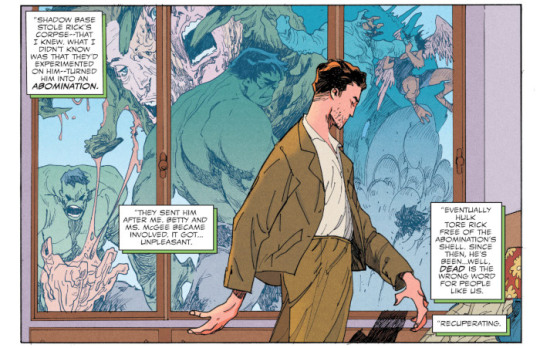
Batman #80 starts the turn for the “City of Bane” arc as John Romita Jr., Klaus Janson, and Tomeu Morey come aboard for the art duties, and Batman and Catwoman return to Gotham. I really like the stylization here, it fits the overall shift in direction and it’s just nice to see Romita and Janson back together.
| Published by DC Comics
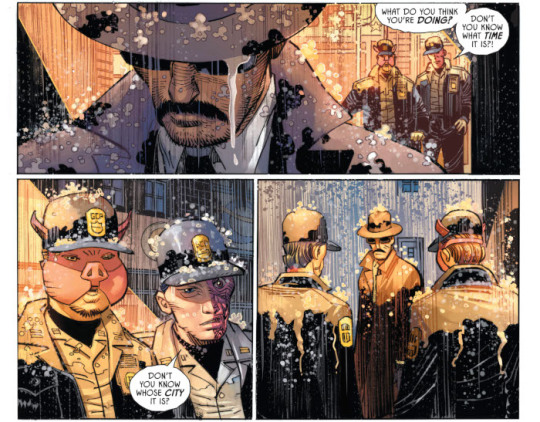
Berserker Unbound #3 is another brilliant issue of this series from Jeff Lemire, Mike Deodato Jr., Frank Martin, and Steve Wands. This one gets to the heart of the existential crisis that the Mongrel King is having in a time that neither he understands or understands him. Though, there are some nice attempts at communication and some great character moments.
| Published by Dark Horse
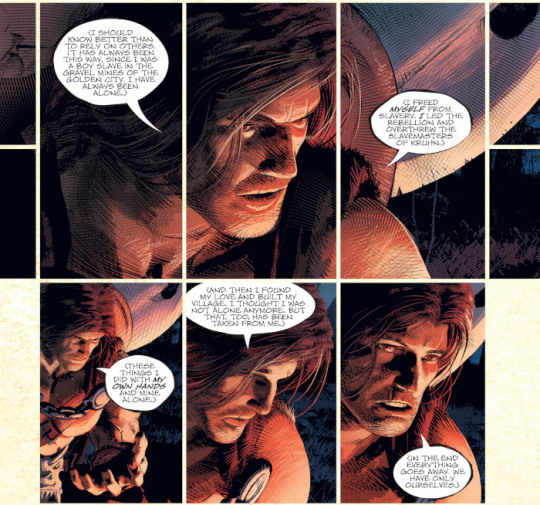
Birthright #40 is pretty huge as it essentially rounds out the current Mastema arc. Joshua Williamson, Andrei Bressan, Adriano Lucas, and Pat Brosseau make a pretty dramatic turn here, with some interesting ramifications.
| Published by Image / Skybound
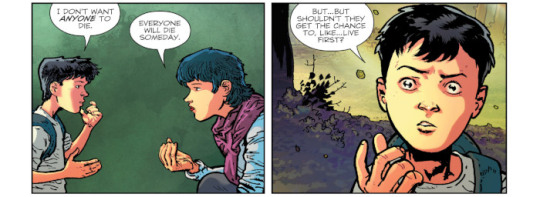
Black Cat #5 delivers a fairly funny conclusion to this heist as Felicia and her crew have to overcome Blastaar. Jed MacKay, Travel Foreman, Brian Reber, and Ferran Delgado are consistently giving us an entertaining and compelling story here with an ongoing narrative broken into discrete, separate pieces that can ultimately be enjoyed on their own.
| Published by Marvel

Black Terror #1 features a rather unique take on the character, and on superheroics in general, from Max Bemis, Matt Gaudio, Brittany Pezzillo, and Taylor Esposito. This explores what happens when the Black Terror hangs up his boots, self-medicates for his problems, and begins to suffer withdrawal from the superhero business. It’s all rather...disturbing, but still entertaining.
| Published by Dynamite
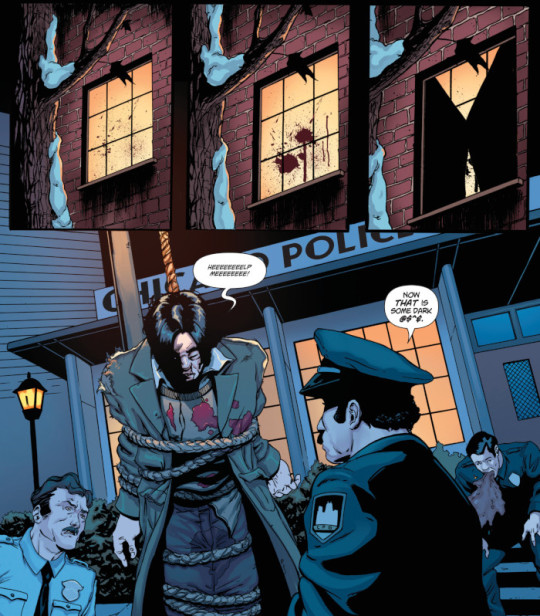
Breaklands #2 starts building up the cast as Kasa falls in with a number of other people to help and rescue her brother. Though there are elements of familiar post-apocalypse narratives here, what Justin Jordan, Tyasseta, Sarah Stern, and Rachel Deering are creating here feels incredibly fresh and different.
| Published by Justin Jordan
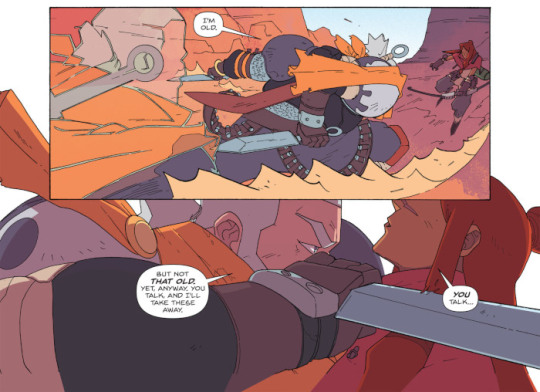
Canto #5 is fairly action-packed as Canto and crew bring the fight to the Furies. It’s a different change of pace here, but we still get some intriguing symbolism and advancement of the fable narrative in rather inventive ways. David M. Booher, Drew Zucker, Vittorio Astone, and Deron Bennett are driving us towards the end here and I feel like it’s going to be a big one.
| Published by IDW
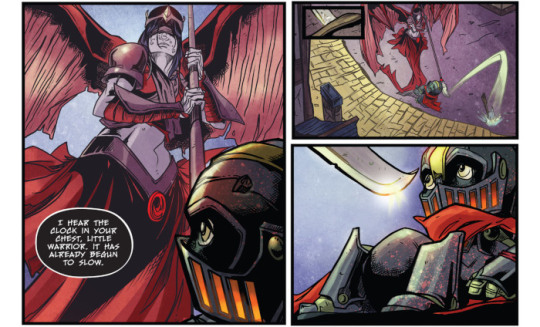
Contagion #1 is probably going to get some comparisons to Marvel Zombies and DCeased, running through similar horror territories, but it doesn’t really matter. While the elements may familiar, it’s still an entertaining start to this series from Ed Brisson, Rogê Antônio, Veronica Gandini, and Cory Petit.
| Published by Marvel
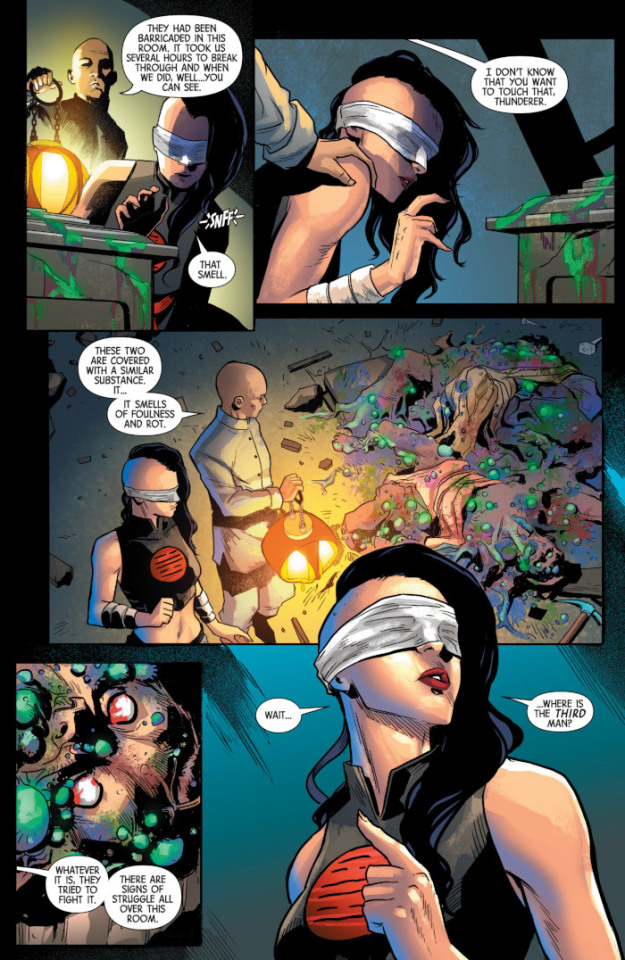
Copra #1 begins a second volume of Michael Fiffe’s previously self-published series, dropping us into the middle of action, picking up where the last series left off. While it is at least initially a bit confusing, Fiffe does include plenty of information, including an issue-by-issue breakdown of the previous series, to get people up to speed. It’s basically ‘80s-inspired superheroics.
| Published by Image
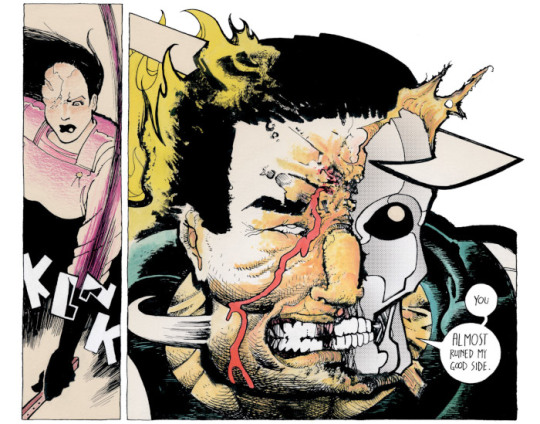
Daredevil #12 is more magnificence. Chip Zdarsky, Marco Checchetto, Nolan Woodard, and Clayton Cowles continue “Through Fear” as Matt has an...unfortunate confrontation with crooked cops beating up a Daredevil stand-in and Fisk has a meeting with the rich “elite”. I really quite like the parallels of both of them falling back on old/new tricks.
| Published by Marvel

Dark Ark: After the Flood #1 begins the very welcome next chapter in this story from Cullen Bunn, Juan Doe, and Dave Sharpe, picking up on what’s been going on after landfall. There’s also some really interesting revelations about Kahlee’s past.
| Published by AfterShock

DCeased #5 is the big penultimate issue, giving us hope as two sanctuaries are established. And then... Tom Taylor, Trevor Hairsine, Stefano Gaudiano, Rain Beredo, and Saida Temofonte give us another chilling story here with some very heartbreaking moments.
| Published by DC Comics
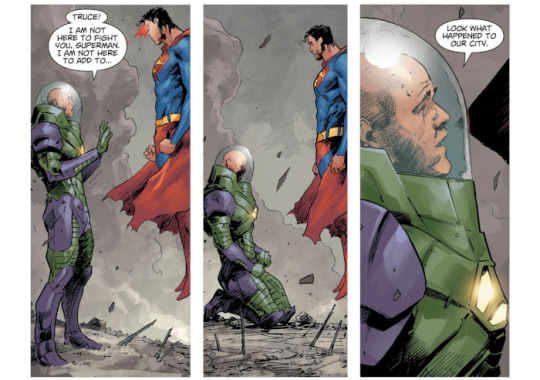
Die #8 keeps the pressure on, Kieron Gillen, Stephanie Hans, and Clayton Cowles continuing to hammer at your emotions as they explore the party even further. This one gives us a bit of a deeper look into our Grief Knight, Matt, and it’s amazing that the bleakness is almost oppressive.
| Published by Image
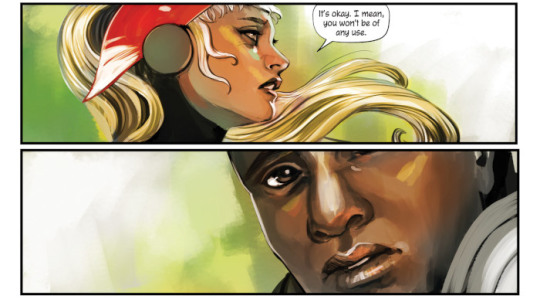
Doctor Strange #20 is kind of a bizarre end to this series as it transitions over to Doctor Strange, Surgeon Supreme later this year. As he searches out ways to implement his newly recovered dexterity, Strange teams-up with Kanna for what feels like one last adventure with her, against the nefarious Cyb(not equal)rdSmPhp (seriously, those symbols may “look” like Cyberdemon, but that’s not what it means) and his master. Great art from Javier Pina and Brian Reber.
| Published by Marvel

Doom Patrol: Weight of the Worlds #4 is another weird one as the team travels to Destiny Beach and Flex Mentallo runs into his old crew. Gerard Way, Jeremy Lambert, Nick Pitarra, Tamra Bonvillain, and Simon Bowland give us an interesting tale of magical muscle mystery here as they try to bring magic back to the beach.
| Published by DC Comics / Young Animal

Dungeons & Dragons: A Darkened Wish #3 gets to the heart of what caused Rayonde to turn in the future and shows what changed between the party. It gets pretty dark as the “darkened wish” plays out. Gorgeous artwork from Tess Fowler and Jay Fotos.
| Published by IDW
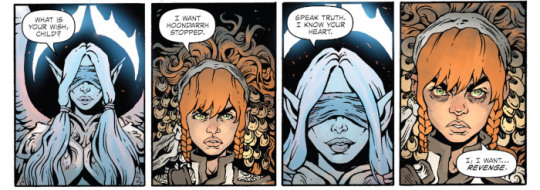
Everything #2 keeps building the mystery of this story, layering on even more strange events and deaths that keep you guessing. Christopher Cantwell, INJ Culbard, and Steve Wands are crafting a weird horror story here that’s rather unique. There are elements here that feel like Twin Peaks and Fargo, mixed with Vertigo, Love & Rockets, Stray Bullets, and the works of Daniel Clowes and Charles Burns, but at the same time something wholly its own.
| Published by Dark Horse / Berger Books

Fantastic Four #15 introduces us to Unparalleled, the heroes of the planet Spyre, in this second part of “Point of Origin”. Dan Slott, Paco Medina, Bob Quinn, Jesus Aburtov, and Joe Caramagna give us an interesting take on the Fantastic Four here as invading alien monsters, complete with monster dialogue, and it’s neat to see them from a different perspective.
| Published by Marvel

Forgotten Home #1 is a new digital Comixology Original from Erica Schultz, Marika Cresta, Matt Emmons, and Cardinal Rae. It’s a very nice mix of magic and police procedural, hinging on a vast missing persons case, and family drama.
| Published by Vices Press
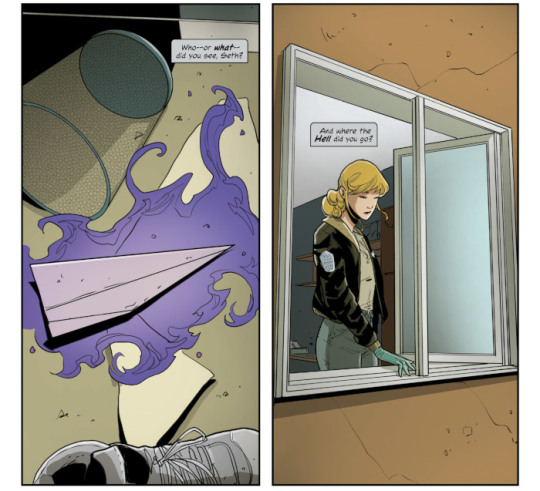
Ghost Rider #1 is a spot on return for Johnny Blaze and Danny Ketch, picking up on the recent rumblings throughout the Marvel Universe (though exactly how it fits in with Robbie Reyes and Avengers is yet to be seen), and veering off into wildly interesting new directions. Ed Brisson, Aaron Kuder, Jason Keith, and Joe Caramagna deliver a first issue that should have old school (and oldish new school, I mean Ketch is a 30 year old character now) fans delighted. Even as Danny’s life is a bit of a mess right now.
| Published by Marvel

The Green Lantern #12 is the fairly impressive “season finale” to this series from Grant Morrison, Liam Sharp, Steve Oliff, and Tom Orzechowski before we get a three-month break with Blackstars and then the start of season 2 next year. Some very big revelations here as we find out what all of the disparate parts of this story have been amounting to. It’s interesting as to how epic all of this feels.
| Published by DC Comics
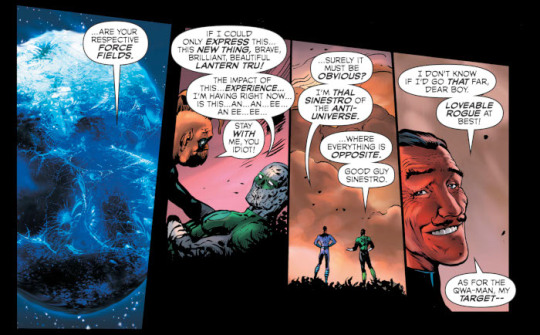
Grendel: Devil’s Odyssey #1 puts a big goofy grin on my face. Aside from blips here and there and the Grendel vs. The Shadow mini-series featuring the original Grendel, Hunter Rose, it’s been almost two decades since we saw the ongoing adventures set in this universe, even longer a story written and illustrated by Matt Wagner (the last one part of canon, Past Prime, was a novel written by Greg Rucka with spot illustrations by Wagner). Like the recent third chapter to Mage, this is a very welcome return. Matt Wagner, Brennan Wagner, and Dave Lanphear take us in an entirely new direction as Grendel Prime is tasked to find humanity a new home.
| Published by Dark Horse
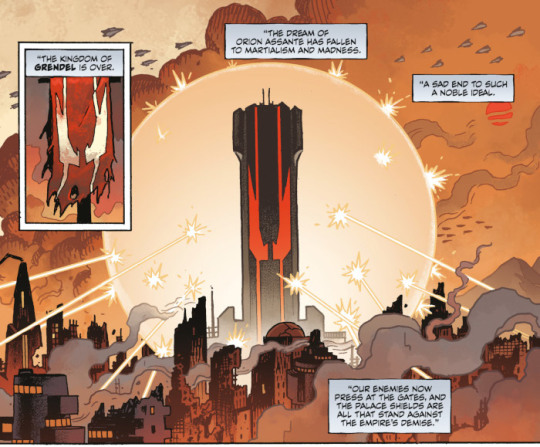
Immortal Hulk #24 closes out the confrontation with Fortean and looks like it’s setting up the next phase for this series (in a two-fold way, both in the immediate future and in the far-flung end of the universe). Al Ewing, Joe Bennett, Ruy José, Belardino Brabo, Marc Deering, Roberto Poggi, Paul Mounts, and Cory Petit continue to work wonders on this series. This issue is horrifying. And perfect.
| Published by Marvel

Joe Golem: Occult Detective - The Conjurors #5 concludes this chapter from Mike Mignola, Christopher Golden, Peter Bergting, Michelle Madsen, and Clem Robins. There’s some very nice Lovecraftian fun here and an ending that sets to fully cap off the upheaval of this series’ status quo.
| Published by Dark Horse

Justice League #33 escalates the “Justice/Doom War” from Scott Snyder, James Tynion IV, Bruno Redondo, Daniel Sampere, Juan Albarran, Hi-Fi, and Tom Napolitano. The various factions of the League are still fighting across time as Perpetua’s lock on power is looking even more certain. The tension throughout this story is incredible.
| Published DC Comics
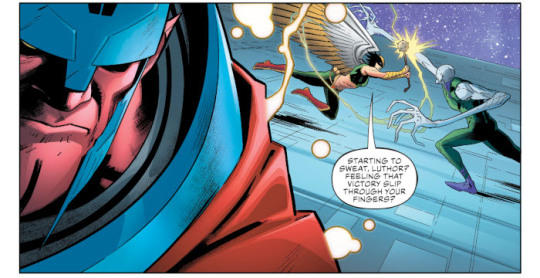
Legion of Super-Heroes: Millennium #2 concludes this trek through DC’s future history, stopping in to check on Booster Gold and OMAC, before getting to the main event with the Legion of Super-Heroes themselves. I really hope that the futures seeded here are followed up on. Gorgeous artwork throughout from Nicola Scott, Jim Cheung, rare interior art from Jeff Dekal, leading to Ryan Sook’s Legion.
| Published by DC Comics
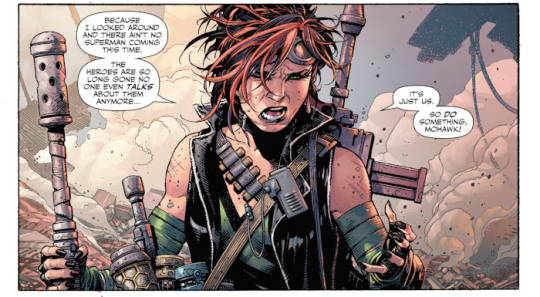
Lois Lane #4 continues to move at a fairly slow pace, but it’s allowing for some great character moments like Jon discussing going off to join the Legion and Vic and Renee trying to piece together continuity that doesn’t exist any more. The art from Mike Perkins and Paul Mounts is still worth picking up this series for alone.
| Published by DC Comics
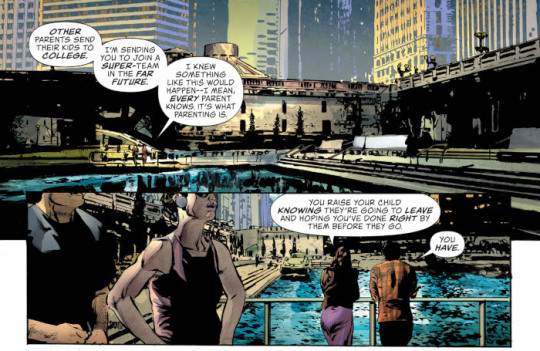
Mountainhead #2 turns things up a notch as everything just gets stranger and a bit more extreme. That odd, not-quite-right atmosphere is perfectly captured by the artwork from Ryan Lee and Doug Garbark.
| Published by IDW

The Necromancer’s Map #2 concludes the bit with the Void Sickness, with some fairly interesting reveals, and throws in some tragic romance while it’s at it. I really quite like how this is pacing along, weaving through details and side bits, while developing Bethany’s larger quest. Beautiful art from Sam Beck and Ellie Wright.
| Published by Vault

No One Left to Fight #4 is stunning. Fico Ossio is delivering the most beautiful art in his career. I mean, just look at it. It’s freaking gorgeous. It also helps that the story from him, Aubrey Sitterson, and Taylor Esposito continues to be incredibly captivating. As we get more old friends and the set up of an old villain’s return.
| Published by Dark Horse

Promethee 13:13 #2 continues this excellent prequel series from Andy Diggle, Shawn Martinbrough, Dave Stewart, and Simon Bowland. The implementation of the conspiracy aspect of the invasion is wonderful to see as the seeds of what’s to come are brought to bear. Gorgeous artwork from Martinbrough and Stewart.
| Published by Delcourt / Soleil
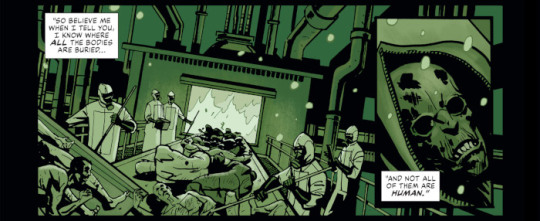
Red Sonja #9 sees Sonja seek out other allies in her quest to defeat Dragan in the form of some rather nasty sorcerers. Mark Russell, Bob Q, Dearbhla Kelly, and Hassan Otsmane-Elhaou deliver another entertaining chapter here, full of magic and more deceit, that certainly makes things a little bleaker.
| Published by Dynamite

Ruby Falls #1 is a wonderful debut from Ann Nocenti, Flavia Biondi, Lee Loughridge, and Sal Cipriano. This first issue introduces us to Lana, her rather unique dysfunctional family, and the backdrop of the tiny former mining town of Ruby Falls. There’s a mix of fallible memories and a criminal past for the town wanting to be forgotten that is very compelling.
| Published by Dark Horse / Berger Books

Savage Avengers #6 continues Conan’s trek as he and Frank Castle travel across the Savage Land and through ordinary Antarctica, as they try to bring Frank’s family back to America. Gerry Duggan, Kim Jacinto, Tamra Bonvillain, and Travis Lanham deliver a fairly interesting story here, transitional, but still an interesting look at the similarities between Conan and Frank.
| Published by Marvel
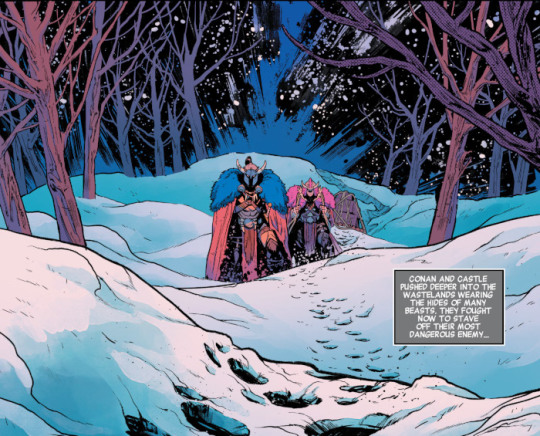
Sea of Stars #4 gives us hints of possibly what happened to Kadyn in order to make him the way that he is, while his father fights for his life on another hostile alien planet. I really quite like how Jason Aaron, Dennis Hallum, Stephen Green, Rico Renzi, and Jared K. Fletcher have been progressing this story, building up the characters, and letting explanations out slowly in what feels like a natural progression.
| Published by Image

Seven Days #1 kicks off this event series from Gail Simone, José Luís, Jonas Trinidade, Michelle Madsen, and Saida Temofonte in grand fashion, developing a new threat to the world behind the “event” that kicked off everyone’s powers and transformation. We get a nice team-up of luminaries Noble, Summit, and Accell before everything goes to hell.
| Published by Lion Forge / Catalyst Prime

Star Wars Adventures: Return to Vader’s Castle #1 is a welcome return of this Halloween anthology series featuring chillers, thrillers, and horrors around the Star Wars Universe. There’s a framing story illustrated by Francesco Francavilla that sets up the theme and reintroduces a character from the first volume, and a central tale illustrated by Megan Levens and Charlie Kirchoff dealing with post Phantom Menace Maul. Both written and letter by Cavan Scott and AndWorld Design respectively. I quite like this format and these stories are highly entertaining.
| Published by IDW
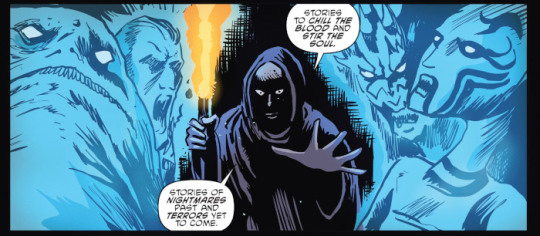
Strange Skies over East Berlin #1 is a riveting beginning from Jeff Loveness, Lisandro Estherren, Patricio Delpeche, and Steve Wands. It starts off behind the Iron Curtain in the heart of Cold War era Germany, with all of the tension and distrust of Russian-controlled East Germany, and it’s ratcheted up higher as a strange light appears as something crashes behind the Wall. The atmosphere is made even more surreal by the almost impressionistic art from Estherren and Delpeche. A great start to this series.
| Published by BOOM! Studios
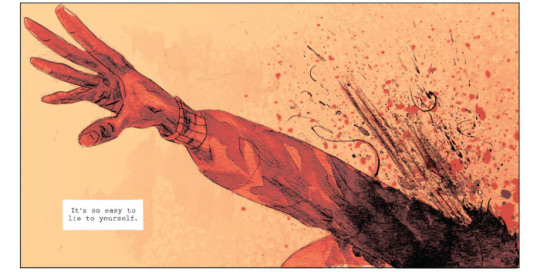
Young Justice #9 continues the team’s confrontation with their evil Earth-3 counterparts, but also gives us a look at Teen Lantern’s origins. André Lima Araújo’s line art during these sequences is worth it alone, but overall I like how Brian Michael Bendis incorporates this into the overall narrative structure.
| Published by DC Comics / Wonder Comics

Other Highlights: Batman/TMNT III #6, Bettie Page Halloween Special, Bizarre Adventures #1, Bury the Lede, Champions #10, Charlie’s Angels vs. Bionic Woman #4, The Dark, Dead Eyes #1, Deathstroke #48, Deep Breaths, The Dreaming #14, Future Foundation #3, gen:Lock #2, Harley Quinn #66, House of X #6, Manifest Destiny #34, Marvel Action: Black Panther #3, Nomen Omen #1, Old Man Quill #10, The Punisher #16, Runaways #25, She Said Destroy #5, Space Bandits #4, Spider-Verse #1, Star Pig #3, Star Wars #72, Star Wars: Doctor Aphra #37, Superman: Up in the Sky #4, Sword Master #4, Thanos: The Infinity Ending, Transformers/Ghostbusters #5, Vengeance of Vampirella #1
Recommended Collections: Edgar Allan Poe’s Snifter of Terror - Volume 1, Giant Days - Volume 11, Immortal Hulk - Volume 1, The Last Space Race - Volume 1, Major X, Mind MGMT - Volume 3: Eraser & The Immortals, Morning in America, Pathfinder - Volume 3: City of Secrets, Stronghold - Volume 1: Primacy, Superman - Volume 1: The Unity Saga - Phantom Earth, The Wicked + The Divine - Volume 9

d. emerson eddy has been trapped by a cat. Please send pizza.
0 notes
Text
Hyperallergic: Sci-Fi Films that Question What It Means to Be Human
Still from Holy Motors (2012), France/Germany, written and directed by Leos Carax (courtesy of Photofest)
When the summer months drive city dwellers toward beaches, lakes, and mountains, multiplexes attempt to keep them indoors by providing a different kind of escape: transporting viewers to distant worlds populated by wondrous creatures in Hollywood’s loudest, most expensive blockbusters. New York City’s repertory cinemas similarly engage audiences during these months with more intelligent science fiction, challenging the mind in addition to the senses. While the summer science fiction series is a common repertory staple, MoMA’s Future Imperfect: The Uncanny in Science Fiction stands apart from the rest with its interest in the uncommon.
“I was hoping at one point to do a science fiction series in which I wouldn’t have to show 2001: A Space Odyssey,” jokes curator Josh Siegel. “I have nothing against it, but when you go through the usual suspects, you’re not left with much room for the less-known films.”
To achieve his goal of showcasing the buried gems of science fiction cinema, Siegel developed three criteria for work featured in Future Imperfect. First, characters could not travel through space. Second, the movies could not feature alien invasions or monsters. Finally, the films needed a present or near-present setting.
These guidelines helped Siegel shine a spotlight on films that question what it means to be human. He started with a list of 900 films and eventually whittled it down to the 60 plus offerings featured in the series, where classics from auteurs like Darren Aronofsky (Pi) and Alfonso Cuarón (Children of Men) stand side-by-side with blockbusters (Minority Report, Groundhog Day), indie milestones (Derek Jarman’s Jubilee), and foreign favorites (Battle Royale, Los cronocrímines.)
In a recent phone call, Siegel discussed the series of cerebral escapism at its August midpoint.
Still from Battle Royale aka Batoru rowaiaru (2000), Japan, directed by Kinji Fukasaku (courtesy of Photofest)
Jon Hogan: The series features blockbusters as well as avant-garde film and video art; what are some of the areas where these two categories of films differ most starkly in their projections of possible futures, and what are some elements about which they’re surprisingly in agreement?
Josh Siegel: In some ways, I don’t differentiate between the two. I think of films as good or less good. You’re either a visionary or you’re not. You can be a visionary working with no money, or you can be a visionary working with a lot of money.
JH: The selection for the series is international, representing 22 countries including the United States, the Soviet Union, China, India, Cameroon, Mexico, and more. What geographic trends stand out in the films’ portrayals of alternate dimensions?
JS: Certainly some have political roots. Obviously Kafkaesque, dystopic visions of the future lend themselves well to people living under Communism in the ‘70s and ‘80s. Invasión from Argentina is an allegory of life in ‘68, which was of course fraught with peril. It’s evident in quite a few Argentine films of the time, some of which were made by actors who were disappeared soon after. This is anticipating Argentina’s entrance into that dark period. Films like the wonderful Afronauts are a sendup of the way in which African countries were pawns in a Cold War game. It’s an inventive approach to their invisibility.
Still from A Scanner Darkly (2006), USA, directed by Richard Linklater (courtesy of Photofest)
JH: The series features several animated selections like Ghost in the Shell 2: Innocence and A Scanner Darkly. The most crucial benefit of animation is its blank canvas, lending the ability to make any event — no matter its unlikeliness — occur in a realistic context. How do these films take advantage of the limitless possibilities that animation allows?
JS: One of the compelling things about Linklater’s A Scanner Darkly is that he found in animation a kind of analogue to the trippy, hallucinatory experience of Philip K Dick’s writing. In the case of Ghost in the Shell 2, it makes possible social and political critiques by being a “mere” animated film.
Still from Ghost in the Shell 2: Innocence (2004), Japan, directed by Mamoru Oshii, (courtesy of Production I.G.)
JH: CGI is the type of animation most common in modern science fiction films. My favorite piece in the series is Leos Carax’s Holy Motors. It’s a feature-length celebration of what can be accomplished without CGI, from Denis Lavant’s fluid acrobatics to the detailed makeup effects that help him embody different characters. What do you see as the benefits and detractions of using CGI in science fiction films?
JS: If you think of a filmmaker like Herzog who doesn’t use any special effects in his films but can still evoke what it is to be in the middle of a desert encountering a mirage, I don’t think you need CG to elicit the same kind of experience. Having said that, obviously there are certain things you need CG for. It would be hard to do Ex Machina without the use of some CG effects. They eschewed CG effects in the sense of using green screen, but they did a lot in post-production. It’s a little hard to convey what a humanoid or an android looks like without CG without it looking campy. Campy can have a virtue; that’s one of the joys of [The Craven Sluck director Mike] Kuchar for example. But it does seem to me that CG is a tool like any other in filmmaking. It has its uses and its abuses.
Still from The Crazies (Code Name: Trixie) (1973), USA, written and directed by George A. Romero (courtesy of Photofest)
JH: It’s interesting to see The Crazies in the series, as it is a lesser-known film of a recently deceased legend: George Romero. How did this film expand on his legacy as a zombie maestro?
JS: As it happens, we worked closely with George on the restoration of Night of the Living Dead that we just premiered several months ago. So it’s a little bittersweet for us because we had the opportunity to get to know him better and really convey to him how much we admire and cherish his film. I had already planned to show The Crazies for precisely the reason you had mentioned. Obviously, George Romero has the blessing and curse of being associated with one genre when in fact he was a kind of scathing observer of American life [and] went way beyond the zombie genre.
JH: In a series focusing on alternate visions of the here and now, which film do you think best captures the current moment? I lean toward Strange Days, which was a revelation to rewatch months back.
JS: I could argue that any of these films is relevant to our present day predicaments. Given that I just read an article the other day that the potency of human sperm has plummeted over the last 40 years, I thought of this film It’s Great to be Alive, one of the early Fox nitrate films from 1931 [sic]. It’s kind of a “Last Man on Earth” story. All of the men have succumbed to a plague called “masculitis.” There’s only one man standing, and — of course — every woman wants a piece of him. It’s a kind of wacky pre-Code comedy from Fox.
Still from Los cronocrímenes (Timescrimes) (2008), Spain, directed by Nacho Vigalondo
JH: Do you have a personal favorite in the series, or something you’re especially excited to share with the public?
JS: It’s impossible for me to say. All of these films excite me in some way or another. I think that Fassbinder’s World on a Wire is an epic film for many reasons, not least of which is its 1970s decor. I have a particular fondness for Polish cinema, so I gravitate toward Andrzej Wajda’s film. It has a wonderful kind of sardonic humor that we know from Polish cinema. These are all films I’d like to watch repeatedly.
Future Imperfect: The Uncanny in Science Fiction runs at the Museum of Modern Art (11 W 53rd St, Midtown West, Manhattan) until August 31.
The post Sci-Fi Films that Question What It Means to Be Human appeared first on Hyperallergic.
from Hyperallergic http://ift.tt/2vMJX0t via IFTTT
0 notes
Photo


From the greatest sea voyage of all time to mischief in Algiers, this is what I read this month.
1. The Enchanted April by Elizabeth von Arnim
Four diverse Edwardian women rent an Italian castle and spend a magical month on the sunny shores of the Mediterranean. This novel is a delightful read that has beautiful and humorous moments in equal measure. Think along the lines of E. M. Forster’s figure of the ‘Englishwoman Abroad’ but written by a female writer. Going South for the English means shedding the trappings of northern society and allowing the passions and vivacity of the South to work upon them and open them to life. The enchanting effect of the South on people of a Northern constitution is a well-known trope but it is interesting to note the warmth which this cliché is dealt with in the hands of a female writer. I highly recommend this to those who’ve enjoyed Forster’s A Room with a View.
2. The Days of Abandonment by Elena Ferrante
Every once in a (long) while, one comes across a novel like Elena Ferrante’s The Days of Abandonment. Its prose delivers such an intensity of raw feeling, that the words seem to burn on the page. This novel is about a 38-year-old woman, Olga, who is abandoned by her husband and left to take care of their children, Gianni and Ilaria, and their dog Otto. Told in the first person, this novel takes you into the darkest depths of Olga’s despair. Ferrante’s female characters are unarguably my favourite in literature — they know they live in a world that is kinder to men than it is for women and they’re haunted by past women and their pain, be they mothers or female figures in their childhood. This book is subtly about a woman living with the shadow of another woman from her childhood, who was also abandoned and had a tragic fate. Ferrante’s writing style is flawless, as always, and some sentences beg to be marked in the margin. One of the best books I’ve read this year so far! If you’ve read and enjoyed the Neapolitan Novels, you’ll also love this one.
3. Hideous Kinky by Esther Freud
I read Hideous Kinky by Esther Freud in a day -- it’s a quick, consumable read. This is a memoir, thinly disguised as a novel, about a mother in search of an adventure, who takes her two daughters to Morocco. The novel is narrated from the point of view of the youngest daughter and it is about living hand to mouth with a single mother in a foreign place. I quite liked its depiction of childhood and the diverse Moroccan people they encounter, with their eccentricities and their kindnesses. The mother is probably the character I liked the least — she can be quite problematic. It’s not a must read, in my opinion, but it’s still a sweet memoir-like novel that recreates the beauty and challenges of childhood.
4. The Lost Daughter by Elena Ferrante
The Neapolitan Quartet is brilliant but Elena Ferrante’s shorter fiction is something else. Imagine the raw emotion, the psychological characterisation, the violence, and the magnetic voice of the narrator of the Neapolitan Novels distilled in under 200 pages, rather than spread across four books. That’s Ferrante’s short fiction. ‘The Lost Daughter’ is a perfect book for those who’d like a ‘beach read’ that is intellectually engaging, a book set in summer on the shores of the Mediterranean that can be read in a day or even a sitting. The narrator, Leda, is a scholar of English in her late forties, who is drawn to a 23-year-old mother and her young daughter playing with a doll at the beach. She is driven to do an explicable thing that takes her to depths of her past and her relationship with her daughters and her mother. Out of all of Ferrante’s characters that I’ve encountered so far, Leda is by far the most enigmatic and the novella at times almost reads like a character-study because Ferrante creates such a psychologically complex woman. I found the ending a bit rushed but I think this is the first Ferrante that really made me want to reread it as soon as I finished it. There is just so much to unpack, so many complex thoughts about being a mother and being a daughter and the bond between the two that deserve to be revisited.
5. The Odyssey by Homer
The Odyssey needs no introduction. This was my first Ancient Greek epic and it was just what I expected. Some parts towards the beginning and the end dragged a bit, but Odysseus’s narration of his travels in the Mediterranean were very quick to get through because they’re such iconic tales and entertaining, too (although the misogyny was irritating). Robert Fagles’s verse translation, published by Penguin Classics, is a great translation in my opinion, but at some point I’d like to check out Emily Wilson’s new translation too. Overall, I’m glad I finally got around to reading this and it inspired to pick up more epics, which I could read alongside other novels. I’m now particularly interested in reading Ovid’s Metamorphoses and Virgil’s The Aeneid.
6. The Mischief by Assia Djebar
Assia Djebar is an Algerian writer that I don’t hear about often. Her debut novella The Mischief (originally La Soif) was published in 1957, just three years after Françoise Sagan’s Bonjour Tristesse and the influence of Sagan on Djebar’s debut novella is palpable. Coming-of-age, body consciousness, sexuality, passion, and death converge on the Southern Mediterranean seascape in The Mischief just as they do in Bonjour Tristesse, with the added themes of the Paris-Algiers binary and race. Nadia, the narrator, is practically the North African equivalent of Sagan’s Cécile -- a carefree and indolent young woman discovering herself and her sexuality, and creating tragic mischief. Although Djebar drew heavily from Sagan, her debut is still wonderfully executed and distinct enough, plot-wise, to be worth reading in its own right. I was specifically astounded by how unlikeable Nadia is, and yet, how masterful of Djebar to still give her an alluring voice that compels the reader to read more. In fact, I read this in a sitting. I’ll definitely read more of Djebar in the future, although her later work seems very different.
7. Tangerine by Christine Mangan
Remember that familiar phrase in book reviews that goes along the lines of ‘the setting is almost a character in itself’? Well, Christine Mangan’s Tangerine truly earns it. This novel is set in 1950s Morocco, Tangerine evokes the mysterious and alluring atmosphere of Tangier. A psychological thriller unfolds in this city’s heat spell: Alice, who was swept away to Tangier by her husband John, one day finds Lucy on her doorstep, a friend of hers she had completely cut ties with. Their past is slowly unfolded through flashbacks and meanwhile, things start taking an ominous turn in Tangier. What I love about this book is that the setting is present in every page; it’s what, I feel, makes this novel so immersive. The chapters alternate between Lucy’s and Alice’s point of view, and the foreignness of Tangier serves to bring out their respective characters. Towards the end (I won’t spoil anything), I was particularly intrigued by how Tangier becomes almost a presence within the characters rather than an exterior space. Since Tangerine, received mixed reviews, I did not have high expectations for this novel, but the setting almost made me completely disregard the predictability of the plot -- although, there were a few good surprises -- and the wordiness of some descriptions of actions -- although the writing style generally flows and is a pleasure to read. Since Mangan provides both the main characters’ perspectives, the reader is always one step ahead of the characters and know what they’re about to face. I guess this puts emphasis on the psychology of the character rather than the unfolding of the plot, which I think works but I can see why some readers demanded more from the plot of a ‘psychological thriller’. The nuance is in characterisation and setting, rather than in plot. I think this was a great debut novel with a gripping opening and a satisfying ending, particularly for someone who is interested in relations between setting and character, rather than plot, although I consumed the plot too!
FAVOURITE BOOKS OF THE MONTH: The Days of Abandonment and The Lost Daughter by Elena Ferrante
Thank you for reading this July wrap-up! By clicking on the titles of the novels I mentioned above, you will be redirected to my Book Depository affiliate link for each novel, enabling you to also read the blurb.
#books#literature#book reviews#read#reader#reading#book lover#bibliophile#bookworm#book stack tag#tangerine#christine mangan#elena ferrante#the lost daughter#the days of abandonment#hideous kinky#esther freud#the enchanted april#elizabeth von arnim#the odyssey#homer#the mischief#assia djebar
8 notes
·
View notes